

F’Hill STORY
From the Headmistress

A very warm welcome to this year’s F’Hill Story.
Towards the end of the Summer Term, I asked several of our departing Upper Sixth what had been the outstanding feature of their Sixth Form experience, which had really made a difference for them. Their answers were remarkably consistent: they all loved having teachers who knew them very well and the distinguishing characteristic was that they felt exceptionally ‘believed in’ by their teachers. Lower down the School, they had not necessarily realised the full power and significance of their teachers’ confidence in them, but they felt this had profoundly changed their outcomes at Sixth Form level.
Being believed in is like possessing a special key to unlock your hidden potential. It gives you a boost to self-esteem and selfconfidence: you believe you can aim even higher. It is a very powerful feeling that lifts you up, whatever your current challenges, and empowers you to reach the toughest goals. Of course, parents are the first and the most central characters in the development of a young person’s self-esteem, but there is a very real sense in which children will listen differently to non-family members and take their ideas very seriously: it’s all part of learning independence and developing an understanding of where you might fit into the world. Being validated and believed in by a teacher gives a unique boost at a time when this is hugely needed. No-one wants to let down either themselves or their parents, but it is another powerful motivator to not let a teacher down.
This deep belief in our pupils is continually reinforced by our Catholic emphasis on the unique dignity and value of each person, as our pupils grow in the understanding that each one of us is loved by God and is on a journey to discern their unique role within the world. They discover that is it just fine ‘to be yourself’ – and we are all here to help them become the best version of themselves. This is a core value that we emphasise in Assemblies as well as through the daily round of lessons and co-curricular activities.
The continual privilege and joy of working with our girls is seeing this process of growth in action every day. It might come in terms of personal development, mastering higher-level skills in sports or the arts, nailing an area of academic challenge, becoming an eloquent and confident debater or being a source of friendship and support for a younger pupil, growing in spiritual understanding or visibly developing the ability to power through setbacks, learn from errors and find success through gritty determination and hard work. So often, we want to turn away from things that feel too difficult, in order to avoid the shame of failure. It is a deeply liberating gift to discover that failure is an essential part of the learning process, a step along the way rather than the end of the journey. I so often see our teachers encouraging intellectual and creative leaps into the unknown, ensuring that the classroom or sports pitch is a safe space to try, to fail, to try again - differently - and, ultimately, to succeed. Our brilliant teaching and support staff wholeheartedly believe in all our pupils and lead them to stretch themselves in ways that seemed unimaginable at the start of the year. This magazine gives you a glimpse of this continuous process in action, celebrating the extraordinary breadth and depth of the accomplishments within this inspiring school community!
Highlights from the Hill
Another incredible year on the Hill has passed by, bringing more moments of joy, awe and celebration as the young women of Farnborough Hill have grown and flourished.
SkyUp Winners
Back in March 2024, we were delighted to find out that one of our Climate Change groups won the national SkyEdit competition with their video! Needless to say, the girls were absolutely delighted to win this national competition and were very much looking forward to their prize: a trip to the Sky Studios at Osterley to record a news report professionally.
Milana (Year 8) reported on the day:
On Wednesday 20 November 2024 we visited the spectacular Sky Studios. As we entered the studios, we could see live news being filmed in a big glass box within the building. Then we watched a video that described how we would make our news report about climate change and were given lanyards that had our roles for the day - producers, directors, presenters, scriptwriters, editors, experts and camera operators. After exploring the massive Sky Studios, we were given 50 minutes to research, write our scripts, record and edit our news report. The most fun parts of creating our news report were researching, searching for costumes for the presenters in the dressing room and the actual recording. After we finished recording, choosing our backdrops for our videos and writing our credits, we were able to watch people working really hard on filming and editing pieces for Sky Sports. It was fascinating to see things we normally watch on TV being created right in front of us.

This trip was a once-in-a-lifetime experience. It taught us a lot about the news and film industry and I am sure none of us will ever forget it!

We were thrilled to win the ‘Best Use of YouTube’ category at Interactive Schools ‘School Stories Awards’. Scan the QR code to explore our channel and see even more of what has gone on this year!
Each Year Group enjoyed a RETREAT DAY off timetable to explore a spiritually-based message, such as Year 11’s day spent considering “For with God, nothing shall be impossible” (Luke 1:37). For more on the Spiritual Life of the School, turn to page 44.



Young Enterprise Team, ‘Everyone’s Got A...’ attended the County Final for the Young Enterprise Company of the Year Competition and promptly secured the award for the ‘Best Company Presentation’!
The annual Macmillan Coffee Morning brings together parents, staff and sixth formers for coffee, cake and great company in the beautiful surroundings of the Grand Salon. For more Charity events, flip to page 54.
Purdue Performance Suite
On Monday 9 December 2024, Farnborough Hill celebrated the opening of the Purdue Performance Suite with a special visit from the acclaimed athlete herself, Charlotte Purdue (Class of 2009).
The afternoon kicked off with an excellent session where pupils had the unique opportunity to sit with Charlotte and learn about her incredible journey. She shared her motivational story of becoming a GB longdistance marathon runner, offering invaluable insights into the world of high-performance athletics.
But the excitement didn’t stop there! Charlotte made the familiar trip down the hill to the Sports Hall, to cut the ribbon to officially open the new Purdue Performance Suite. Since its state-of-the-art refurbishment, the suite has proven incredibly popular with the girls. They have enthusiastically embraced the new equipment and training opportunities, with many girls incorporating regular strength training into their routines.
To commemorate this special occasion, Charlotte generously gifted us her bib from the 2008 European Junior Cross Country Championships, at which she won Silver and Team Gold - a truly unique and cherished memento.



Inspiring Spaces
The first half term of the year was brought to an end with the Friends’ spectacular Fireworks Display.

The Purdue Performance Suite wasn’t the only update to the School this year! Work on creating Inspiring Spaces in which to learn continued, with the RE, History and Classics classrooms getting colourful make-overs. The Science corridors were also treated to some inspiring new murals. Plans for 2025 - 2026 include refurbishing the Mathematics classrooms and creating a Year 11 Common Room. Watch this space!
We have also opened a beautiful new multi-faith prayer room, The Haven.

Paws in Work brought an adorable litter of cockapoo puppies to Upper Sixth’s PSHEE Day.
Their business concept involves socialising young puppies by bringing them to schools and workplaces, while aiding the mental health of those fortunate enough to enjoy a cuddle and play!


The eco-friendly JLTrees initiative, which began in 2021, saw five new Christmas tree saplings planted by Year 7 representatives of each House. They join 15 others which have been growing steadily, ready to stand festooned in the School when the girls who planted them are in the Sixth Form!
Pupils were keen to let their voices soar in our inaugural Christmas Open Mic event in the Ref during the last week of the Autumn Term. Mariah, you have some serious competition!
Highlights from the Hill

National TeenTech Winners
Year 7 pupils Tia and Alice secured the prestigious ‘People’s Choice’ Award for their home monitoring project, TAY.
At the end of June 2025, at the Institute of Engineering and Technology in Savoy Place, London, Year 7 pupils from Farnborough Hill, Tia and Alice, attended the highly prestigious TeenTech Awards Ceremony. TeenTech is a national STEM based competition: it is a celebration of the talent and creativity of young people who have risen to the challenge of making life ‘better, simpler, safer or more fun’. Over 1,500 pupils from across the country submitted projects with just 72 teams, comprising 148 pupils, making it to the judges’ day.
Having worked on their project, TAY, since last September, Tia and Alice were selected as finalists in the Safety and Security category. The girls’ project was judged by the sponsors of the Safety and Security category, Commvault, who were genuinely impressed with their work, the model and how the girls presented themselves. Tia took a lead on explaining the project which was devised to monitor safety and security in a domestic setting. The detailed model had a range of sensors and monitors for detecting smoke, temperature, moisture and motion, and a RFID entry system.
The girls also faced scrutiny from their peers and fellow finalists, who toured the exhibition of creations and chose their favourites from the entries. They were thrilled to subsequently be revealed as the winners of the People’s Choice Award.
Head of Design and Technology, Mr Ciaran Bradley, who supported the girls throughout their project, commented:
“I was incredibly impressed with Tia and Alice, from their initial concept and ideas to their top-class execution within their model. They built complex circuits and problem-solved, tweaking and honing their design to achieve a fully working model which could be scaled up to a state-of-the-art home monitoring system. To have this ingenuity at just 11 and 12 years old is phenomenal. The competition to reach the final was tough, and to be one of just 72 teams to do so is a testament to their teamwork and determination. Being awarded the People’s Choice Award, voted by their peers, was incredible and very, very welldeserved.”
Pupil Tia added: “My experience at TeenTech was really exciting and fun. One of the best parts was when the judges came over to talk to me about my project. They asked interesting questions and really listened to what I had to say, which made me feel very proud. It was so cool to get feedback from people who work in tech and science, and it showed me that my ideas could actually matter. They gave me some great advice, and it made me want to keep learning and coming up with new ideas in the future.”
Huge congratulations to Tia and Alice, Farnborough Hill is very proud of you!

Congratulations to Isabella (Year 11), Udita (Year 10), Maeve and Lydia (Year 9) who took part in the follow-on rounds of the UKMT Maths Challenge Kangaroo. A massive well done to Maeve who attained a Gold certificate and Lydia who received a Silver!

Congratulations to Dr James Quinnell, whose book, ‘The Brontës as Gothic Writers’ was published over the Easter break.


A massive congratulations to Saajana (Year 7) and Orla (Year 8) for both receiving a Bronze certificate in the UKMT Junior Kangaroo Challenge!

The MFL Department was thrilled to welcome the Onatti Theatre Company into school to perform a play, entirely in Spanish, for pupils in Year 9 and above. The play, Primera Cita, used clear visuals and plenty of repetition to make it easier for everyone to follow. A highlight was when Year 11 pupils Rose and Greta volunteered to take part in one of the scenes and had a great opportunity to show off their Spanish conversation skills!

Maths Fest 2025 saw Farnborough Hill pupils bring home the ‘Maths Slam’ crown for the THIRD year in a row! Congratulations to Upper Sixth students Isobel and Eesha, who saw off stiff competition to win with their amazing presentation about the Four Colour Theorem!
Read more about Maths Fest on page 30.

Over the past year, new Year 7 pupils have climbed the Hill for lots of joiners events, from their Taster Day back in June 2024 to F’Hill Friday subject sessions, the surprisingly lively assessment day and the unsurprisingly livelier F’Hill Challenge! They are now very much part of the community, roaming the corridors without fear of getting lost and firming up their friendships with every shared moment. Welcome, Class of 2032!


The annual Valentines Book Swap allowed visitors to the Library to find a new love in the form of a mystery date with a pre-wrapped book. Subtle clues on the cover allowed pupils to pick their genre, finding out which story they’d be delving into once they’d committed to unwrapping!


Study Leave for both A level and GCSE examinations began in style with celebration days to mark the end of one chapter and the beginning of the next! For Upper Sixth, in particular, it was bittersweet as their final lessons on the hill came all too soon and it was time to hand over to the next cohort.


Over 100 Year 5 girls joined us to try life on the Hill across two sunny days in June 2025. Year 11 helper, Georgia, commented: “Their bright smiles, eager participation and curiosity highlighted the day! Hearing girls say ‘I want to come back’ or ‘can we do that again’ was so rewarding and I hope the girls left with fond memories.”



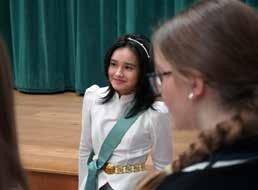
Culture Day was a colourful (and tasty!) celebration of all the vibrant traditions which make up the glorious Farnborough Hill community.
Highlights from the Hill
Year 7: Sustainable Engineering
Year 7 pupils had a fantastic visit from Baker Hughes, focusing on sustainable engineering. Their day was filled with practical activities designed to sharpen their problem-solving and logical thinking skills.
One ‘aha!’ moment was undoubtedly the construction of the tallest lollipop stick tower and it was great to see the girls using their ingenuity to test which structures were the most stable. The day ended with a Dragons’ Den-inspired competition where pupils designed rollercoasters. This genuinely tested their problem-solving skills as they explored how they could make their designs cheap, sustainable and fun, whilst also ensuring that safety was a priority. In the face of strong competition, it was the most creative rides that ultimately won.
The girls thoroughly enjoyed the day and learned a great deal through the experience.



Moving on Up!
Sixth Form and Year 7 Introduction Days brought new faces and new chapters as pupils joined their new cohort for the day, getting the chance to settle in just a little before the summer break.
Junior Prize Giving, which took place on Wednesday 2 July 2025, was a heartfelt and happy celebration of the accomplishments and development of our Years 7 and 9 pupils throughout this past school year.

GCSE and A level Results

After a busy Summer Assessment Week, the Year 10 girls enjoyed a taste of what awaits them in sixth form on the hill. Their two-day taster experience gave them a good understanding of the academic, social and personal development opportunities available to them.


The Class of 2025 celebrated incredible A level results, with half of all grades being at A or A*. 43% of the Year Group averaged a grade A across their subjects, with particular mentions to Alice, who earned 4A*s (plus an A* in her EPQ) and to Delilah, hugely admired Head Girl, who banked 3A*s alongside all her Junior Leadership responsibilities. Delilah has secured an offer to read Medicine at university, while Alice holds a place at Imperial College for Natural Sciences.
The traditional subjects of Mathematics and English Literature delivered excellent outcomes for their students, with Mathematics averaging an A grade and English a B+. The Sciences, with 32 entries across the three subjects, averaged B+; History, French, Politics and Further Maths delivered an average A grade.
The Class of 2027 celebrated very impressive GCSE results the following week, with 26% of grades earned being 9s and 8s, and just under half of grades 9 – 7. A superb 96.4% of grades were 9 – 4; a phenomenal statistic which reflects the work ethic of this super Year Group.
EPQ Results
At the beginning of 2025, 16 members of the Upper Sixth received their final grades for their EPQ projects, which they completed last year; 43% of all projects were awarded A* / A! Special congratulations must go to Lucy, Sarah, Alice and Rhea who achieved the highly elusive A* grade, no easy feat alongside studying three or even four A level subjects. The projects produced demonstrated the cohort’s wide-ranging interests, with titles from ‘Should European governments take more action to remove war munitions from the sea?’ and ‘To what extent can using a Generative Artificial Intelligence model in place of actors be ethical?’ to ‘Is intelligence a product of nature or nurture?’’

Staff vs Sixth Form Rounders
The long-awaited Sixth Form v Staff Rounders finally took place (after several heat-related postponements!). With bats in hand, a competitive spirit, and a buzz in the air, both teams gave it their all in a game which fiercely blended athleticism and good fun!
Watched by enthusiastic supporters, cheers erupted with every impressive hit and catch - though it must be said, the crowd’s support leaned heavily in favour of the staff who, in the end, managed to steal the win.
On Saturday 28 June 2025, the Class of 2025 made a dazzling return to school, dressed up to the nines! Blessed with glorious weather, the cohort gathered on the Cloisters Lawn for drinks with parents before moving inside for an outstanding meal, expertly prepared by our Catering Team, and an evening of dancing.


Summer on the Hill

St Anne’s courtyard was awash with colour as the annual Art Exhibition showcased dynamic Art and D&T creations made by our pupils this year. For more artwork, turn to page 57.
Our fantastic Friends of Farnborough Hill laid on the most glorious evening fair offering the whole school community a wonderful opportunity to see out the Summer Term, and indeed the academic year, in style.
From traditional games, mostly run by very kind and patient pupils, to the giant inflatable obstacle course, bungee run and brilliantly fun sumo suits, there was something for everyone. External vendors completed the line up (tinsel hair and glitter tattoos galore!), all set to a backdrop of musical performances from our own gifted musicians. Seeing the Millennium Lawn festooned with families and friends enjoying good food, great company and warm summer sunshine was tonic for the soul after a hectic few weeks on the Hill. It was a beautiful reminder of the community that makes Farnborough Hill such a special place to be.
A huge (HUGE!) thank you to all the parents and pupils who worked behind the scenes and on the evening itself to make this a really special end to 2024 - 2025.

Bees
Last year’s brutal weather severely impacted our apiary, claiming both our beloved bee colonies, despite our best efforts plus expert advice from the Abbey’s seasoned beekeeper, Abbot Cuthbert. A double queen loss left our hives in turmoil and sadly summer’s end revealed empty hives.
Fast forward to May 2025 and hope was, once again, blooming as Sister Elizabeth and I collected two new colonies from Andover. These came with six frames full of eggs, larvae and a queen bee. The air-conditioned journey kept our buzzing passengers comfortable in their blue travel boxes. With bee suits with us just in case, we could hear the bees thrumming in the boxes and feel their vibrations when we put our hands on them.
Back at school we opened the boxes in their designated spots in the apiary. When released, the bees fly round in small circles, which get larger and larger as they orientate themselves. This continues for about 20 minutes until they start to fly straight and have got used to their new surroundings. Being blessed with very fine weather, there was plenty of heat and light, so it was not difficult for the bees to adjust. Then, a swift move – old boxes out, pristine wooden hives in. Carefully, we transferred each frame into the new hive, our eyes peeled for royalty. Success! A queen marked with a green dot from last summer! Finally, we gave the bees a good feed of syrup to help them get established.
A few days later, a queen-spotting mission on one hive proved successful. It was full of activity, drawing out a great deal of wax ready for eggs to be laid. Weekly checks are now underway to see how they are getting on and whether they need an extra box added to the hive to give more space.
We have now started Beekeeping Club for Year 9 pupils and girls have come to learn some theory before they visit the apiary. We are looking forward to helping our new bees to flourish over the summer and for the years ahead!
Mrs Sarah Oscroft, Teacher of Gergraphy
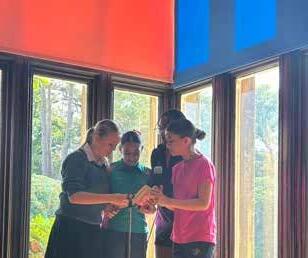
Global Events
Remembrance Day
Three pupils donned their
National Poetry Day
The National Literacy Trust states that their “latest research published on National Poetry Day reveals that poetry can have hugely significant benefits to children’s mental wellbeing, confidence, aptitude for learning and their ability to develop empathy”.
So, when we held our annual Poetry Slam in the Library on an October lunchtime in 2024 there was a selection of poetry books, a collection of girls, a sprinkling of teachers, a cacophony of voices and lots of sweets! It always makes me smile hearing the choices that the speakers make as to which poem they read aloud.
Throughout the day, during Year 8 and Year 9 Library lessons, we had three different styles of poetry creation at the tables. The first was ‘A Box of Inspiration’, a junk box of stuff that could inspire a new poem. The second was ‘Blackout Poetry’. An old Library book was sacrificed and black pens used to colour out extraneous words: those left formed a new poem. The third table had a ‘Box of Headlines’ cut from old magazines and newspapers. The girls had great fun finding words and sentences and then joining them together to create a new poem. At the end of each lesson, we gathered on the sofas to read out their really impressive creations.
Ms Cathi Woods, Librarian
World Mental Health Day
On Thursday 10 October 2024, we celebrated World Mental Health Day with an ‘open house’ in Lafosse, where, in return for a small donation to YoungMinds, pupils from all Year Groups were welcomed with hot chocolate and calming music. Some took advantage of the mindful colouring station, while others engaged their friends in meaningful conversation or played board games.
The event reminded us of the importance of our mental health, encouraging us all to prioritise self-care through talking, taking breaks, and engaging in ‘in the moment’ activities.
Gabriella (Upper Sixth)

Cadet uniforms to participate in the annual Remembrance Day Service in November 2024. Josephine (Year 10), Army Cadet, Deep Cut Detachment, laid the wreath of poppies at the foot of our altar, after marching in with Alyssa (Lower Sixth), Air Cadet Squadron, Guildford 261, and Carla (Year 9), Air Cadet Squadron, Camberley 1075. There were many Girl Guides who also wore their uniform to help mark this day of Remembrance. Year 10 pupil Jessica played The Last Post as the School fell silent.
Children’s Mental Health Week
“Knowing yourself is the beginning of all wisdom” - Aristotle
Based on the wisdom of Aristotle, it is often said that in order to grow and develop, whether academically or personally, you need to understand yourself, and it is for this reason that the theme of this year’s Children’s Mental Health Week (February 2025) was “Know Yourself; Grow Yourself”. Self-awareness is essential to personal development. When we take the time to reflect on our lives, we gain clarity about what motivates us, what challenges us, and where we wish to improve. This awareness helps us make conscious choices rather than acting on impulse or external


pressures. For example, knowing that you are someone who values deep connections with others can motivate you to cultivate meaningful relationships, as opposed to simply seeking superficial interactions. Similarly, understanding your weaknesses, such as a tendency to procrastinate, can help you devise strategies to combat it, allowing you to be more productive and efficient.
Growth, however, is not a one-time event but a continuous process. It is about evolving, challenging ourselves to reach new heights, and improving on our current state. It is about taking what we have learned and applying it to our daily lives. If we remain stagnant in our understanding of who we are, our potential for growth becomes limited. Self-awareness allows us to track our progress, re-evaluate our actions, and adjust our course as needed.
Ultimately, the path to growth is rooted in self-knowledge. The more we understand ourselves, the more we can consciously direct our actions toward becoming the best versions of ourselves. “Know yourself; grow yourself” is a reminder that true transformation begins within. When we make the effort to understand who we are, we give ourselves the opportunity to reach our fullest potential.
Mrs Laura Evans-Jones, Interim Deputy Head - Pastoral




VE Day

As part of World Book Day celebrations, Japanese artist, Chie Kutswada, lead masterclasses for the Lower School on Manga drawing. Chie guided the girls through the fundamentals of Manga drawing and explained how expressive Manga art can be. By the end of the sessions, the girls had created their own Manga characters!


World Book Day
A heartfelt thank you to our incredible parents, pupils and staff for making this year’s World Book Day truly spectacular! Time and resources are precious so the effort everyone put into celebrating the joy of reading was truly appreciated. The variety and creativity of the costumes never disappoints and this year was no exception, from a literal Lorax to Alice in Wonderland, Alvin and the Chipmunks to The Midnight Gang, not forgetting all of the staff who dressed up as characters from Harry Potter.
Ms Cathi Woods, Librarian
International Women’s Day
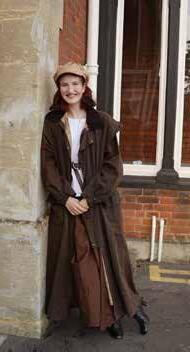
For International Women’s Day 2025, our school community celebrated #AcceleratingAction - a call to break down barriers and create a more equitable world for women and girls. Our girls speak about action in its many forms. For some, it’s about demanding a level playing field in sports and for others, it’s about dismantling subject bias, ensuring that every girl has the freedom to pursue her passions without limitations.
As an all-girls’ school, we understand the importance of empowering our pupils to become agents of change and this year’s theme resonated deeply with our mission to equip every girl with tenacity and resilience.

On Thursday 8 May 2025, we celebrated the 80th anniversary of VE (Victory in Europe) Day. As we were spoilt with some tasty sweet treats in the Refectory, the red, white and blue decorations reminded us of what might have been on display in the same room on 8 May 1945.
It is particularly important to look back at our school’s own history during that momentous time, brought to us across the ages and through the eyes of Rani Blood, our Head Girl of 1944 - 1945. Her first-hand account captured the atmosphere as news of the German surrender reached the Hill.
Mental Health Awareness Week

As part of Mental Health Awareness Week in May 2025, we considered how our ‘village’ here on the Hill is so strong. The School naturally feels like a community because it brings together pupils, teachers, staff and families with a shared purpose, but life in the School also has a natural rhythm and flow that creates a myriad of opportunities for connection outside of formal lessons. Whether through a Choir rehearsal or a Cricket match or Crochet Club, there is a strong sense of belonging - pupils are known by name and individual talents are recognised. Everyone has a place and a role to play in the community. Challenges are faced and overcome together, and this, too, gives strength to our sense of community - feeling that you are noticed and that you matter is important.
Community is everything, especially when it comes to mental health. During Mental Health Awareness Week, it was a great time to remember how much we actually need each other. Having people around who support you, check in on you, and just get what you are going through can make a huge difference. Whether it is family, friends or even online groups, being part of a community helps you feel less alone. It reminds you that others care and that you are not dealing with your challenges by yourself. No one is meant to go through life alone, and we all do better when we look out for each other. So let’s talk, listen and support each other - mental health isn’t just personal; it’s something we can take care of together.
Mrs Laura Evans-Jones, Interim Deputy Head - Pastoral

The Reflections of a

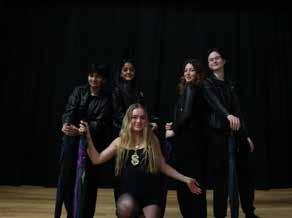
Head Girl
As my time at the Hill drew to a close, I found myself reflecting on everything this school has given me, and everything I have been lucky enough to give back. Being Head Girl has been an honour beyond words. It has definitely been a challenge, but it’s been a year full of laughter, growth, and unforgettable moments. If I could do it all again, I would in a heartbeat.
When I stepped into this role, I knew I had some incredible shoes to fill. Suhana, our previous Head Girl, led with such warmth, kindness and confidence. She left behind a legacy that inspired me and gave me a real sense of what it meant to be a Head Girl at this school.
From the start, I wanted to lead with approachability, positivity, and a good sense of humour. I didn’t want to be someone you only saw in Assemblies, I wanted to be someone you could wave to in the corridor or ask for help from. If people remember me as someone who was kind, reliable, and maybe a bit ridiculous at times, then I would be extremely proud.
Some of the most memorable moments of my school journey have involved terrible, uncoordinated dancing. It all started back in Year 10, during Sports Day, when a sudden downpour led to a spontaneous and very enthusiastic dance in the rain. We had our rendition of Tom Holland’s ‘Umbrella’ performance during the charity Lip-Sync and we danced along to Tani’s singing during Mass. Mr Adam’s inspired us to perform ‘I Love the Flowers’ during our first ever JLT led Assembly and we tore up the dance floor in every Sixth Form social. The dancing is always fun, but more than that, I think it shows how Farnborough Hill is a place where we feel safe enough to truly be ourselves, even if that means embarrassing ourselves in front of everyone.
Another highlight, one that truly defined my year as Head Girl, was Charity Week. It was, hands down, the most fulfilling week of my life. The whole school came together, and we were able to raise thousands for important causes. The week was filled with joy and my favourite event of all was the School’s first ever Colour Run in memory of our dear friend, Kai. It was truly such a beautiful moment: colour everywhere as we ran/ walked around the gorgeous grounds.
Of course, no reflection would be complete without a respectful jab at Mr Mac - Bickford’s Head of House and my long-time rival. Roantree is, and always will be, superior! Our friendly competition added so much fun and excitement to
House events, and I’ll genuinely miss that ongoing battle (even if I won most of it). Six years ago, Social Justice pupils were given the opportunity to choose meaningful House names that reflect our school’s values and these Houses are part of what makes Farnborough Hill so special. The friendly competition between Houses demonstrates the incredible sportsmanship and camaraderie that our school fosters.
On a more serious note, I also want to reflect on the resilience this school has taught us. Back in Year 8, when we were thrown into lockdown, the School’s response was phenomenal. Teachers adapted overnight, learning didn’t stop, and support was always there, even when we all claimed our microphones “weren’t working” a little too often. That time showed me how much this school values each of us not just as pupils, but as people. It was a strange, uncertain chapter, but it made the years that followed feel even more precious.
None of what I’ve experienced this year would have been possible without the people around me. I was so lucky to have had my best friend, Diya by my side - my fabulous sidekick and my constant source of energy and support. We’ve tackled every challenge together with humour and heart, and I genuinely couldn’t have done it without her. I also want to thank the amazing Junior Leadership Team: Gabby, Eloise, Tani, Rain, Sugden, Matilda, and Zoe. They’ve been the driving force behind everything that we have accomplished this year. Their ideas, dedication, and team spirit were infectious and inspiring.
To everyone at Farnborough Hill: Say yes to the amazing opportunities. Audition, volunteer, get involved - you’ll be amazed what you learn about yourself. Appreciate this time because it will be over before you know it but you will have made the most incredible memories to last a lifetime!
Leaving the Hill feels surreal. I’ll miss the chatter of the Common Room, the spontaneous dance breaks, our inside jokes, and the sense of belonging. This place has shaped me more than I can explain but something tells me Farnborough Hill still hasn’t quite seen the back of us!
Thank you for the opportunity to be your Head Girl. It’s been the greatest privilege, and I’ll carry it with me, always.
Delilah, Head Girl 2024 - 2025







Senior Prize Giving
We were delighted to welcome alumna Christina Macfarlane to present the prizes at Senior Prize Giving on Friday 27 June 2025.
Christina, now a prominent CNN International Anchor with a decade of experience as a sports correspondent, shared her remarkable journey since leaving Farnborough Hill in 2001. Her speech took Christina back to her own school days at Farnborough Hill - a connection she shares with her family, as both her sister and mother are also part of our Farnborough Hill alumna.
During her time at school, Christina was singlemindedly focused on reaching the Olympics as an athlete and she humorously recalled captaining Olympic Gold Hockey medallist, Alex Danson, on the School’s Hockey team. While she went on to study English and American Literature at the University of Wales and even trialled successfully for the Welsh National Rowing team, she didn’t make the England Hockey team. It was at this point, Christina emphasised, that she learned the crucial importance of pivoting. If she couldn’t make it to the Olympics as an athlete, she was determined to be there as a sports journalist. This determination led her to an internship at CNN at the age of 25. From there, she diligently worked her way up through the ranks, becoming a Producer, Reporter, Correspondent, and finally, an Anchor. In a full-circle moment, the very year she was made an Anchor at CNN, she was sent to cover her first Olympic Games in Rio where she witnessed Alex Danson and her team win their first Olympic Gold medal. Christina vividly recounted standing in the press box after the victory, hoping Alex would spot her. Alex did, running over, waving her gold medal, and embracing Christina with the memorable words: “We’ve come a long way from the playing fields at Farnborough Hill”.
Having been a CNN Anchor since 2016, Christina provided a powerful glimpse into the reality of being a true journalist. It means spending weeks fact-checking a story in Gaza before publication. It means being on the ground in Zaporizhzhia, diligently seeking evidence of war crimes. It means, as her colleague is currently, being in Tehran to speak directly with the Iranian people about the prospect of war. It’s about being truthful, not neutral. In a generous gesture, she offered her time to anyone interested in pursuing a career in journalism, a career she is passionate about, and a career often misrepresented in the age of
social media, AI and a complex political climate. She assured the girls that no matter how news evolves or on what platform it’s consumed, there will always be a need for journalists.
Christina shared three invaluable pieces of advice and traits that she believes helped her transition from Intern to Anchor:
1. Feeling the fear and doing it anyway: Christina highlighted that self-belief is a superpower. We should, she asserted, confidently declare, “I can and I will.”
2. Take the initiative: she urged the girls to be proactive, alert and always aware of expectations. Having that report ready, those statistics at hand, or that great idea before being asked for it, she explained, will get you noticed and help you get ahead.
3. Go about your work with kindness: Christina firmly believes that a “dog-eatdog” work environment signals a problem. It is entirely possible, she emphasised, to be kind, empathetic and still succeed in life.
It is these very traits, Christina believes, that led her to become an award-winning Anchor. Her compassionate and kind approach as well as thorough preparation for an interview with Roger Federer saw him opening up and sharing things he had never revealed before.
Christina cautioned against being swayed by what you see on social media, or by the perceived achievements of others. “It’s the small, unglamorous steps that will set you up for success,” she stated, “the consistency, the repetition, the work you do when noone is looking.” For this consistent effort, she stressed, you must truly love what you do. She encouraged our leavers to find a profession that speaks to their heart, offers fulfilment, and provides purpose. It’s not about changing the world but about finding something that feels like an extension of who you are.
Finally, Christina spoke about the profound role of faith in her life. As a Catholic, faith has always been central to her and her family, a foundation strengthened during her time at Farnborough Hill. It has taught her to act on what she knows to be true, right and just. It has instilled in her a deep sense of inclusivity for all people, regardless of their religion, culture or beliefs. Ultimately, it has provided her with an inner peace during challenging moments. She encouraged the girls not to be afraid to tap into these values when they may need them in the future.
All Girls’ Education

Long live the independent girls’ school!
Back in February 2025, The Daily Telegraph lead with the alarming headline: ‘The death of the Private Girls’ School’. That stark title gave nothing away - was this supposed to be a good or bad thing? Is it inevitable? Has it happened already?
What followed, although full of statistics that should worry anyone genuinely interested in gender equality and social mobility, was actually a hymn to the countless benefits of an all-girls’ education. Nothing was very surprising to me, and the themes were the usual ones that I speak about at Open Days, but I did rejoice to learn that all except two of Labour’s independently-educated MPs attended girls’ schools! Could it possibly be that something in their educational experience gave them the confidence and the drive to take their place in Government? There was an accusation that Labour’s female MPs are effectively pulling up the ladder behind them, by allowing through the raft of financial measures that are currently challenging the independent sector, with girls’ schools being particularly hard-hit as they typically lack the long-established financial cushioning and alumnae giving culture enjoyed by the more ancient foundations, originally boys’ schools. I really hope that gave some of them pause for thought.
We have long known that girls in girls’ schools get better examination grades than girls who attend co-ed schools. They are more than twice as likely to take the most demanding STEM subjects at A level and are three times as likely to take Further Maths. We certainly see this every year with our own sixth formers. GSA research also shows that girls’ school pupils are far more likely to play Cricket and Football than if they were attending a mixed school.
We see, every day, the empowering and transformational effect our girl-centred education has on your daughters. The teenage years hold such challenges, perhaps now more than ever before, but we are all committed to helping your daughter thrive in these turbulent times, to know herself and to feel comfortable, to find her spark, to learn to serve others, to do the very best that she can and to be happy. This is a joyful school, with a big heart, and although society has changed profoundly since the early days of the RCE Sisters, their faith-filled vision and commitment to creating a school with a powerfully transformative ethos has never dimmed. Schools like ours have a real impact on girls’ life chances and we are delighted to offer this to your daughters. It remains an inspiration and a privilege. Thank you for your support and long live the Independent Girls’ School!
Mrs Maria Young, Headmistress


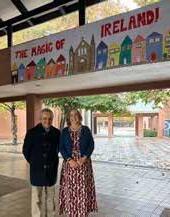
Chilean School Partnership
It’s always exciting when a new door opens, especially when it leads to an entirely new corner of the world. Recently, an exciting opportunity has arisen that will see Farnborough Hill developing ties with a school an ocean away in Santiago, Chile.
Now, you may be thinking, “Chile? That’s quite a leap!” and you’d be right! But this rather wonderful partnership came about thanks to our fantastic Spanish Assistant, Señora Bravo de Amesti. She used to teach at Colegio Las Ursulinas and her daughter even attended the school.
When she shared stories about Las Ursulinas, we both immediately felt it could be an excellent fit for Farnborough Hill. I’m incredibly keen on building a genuinely international outlook for our pupils, and getting to know a different part of the world through forming international friendships is such a brilliant way to do it. So it was with great excitement that I found myself making my first visit to Chile over half term, taking a long but direct flight from Heathrow.
My experience at Las Ursulinas was simply wonderful. The day began with Mass for Santa Angela Merici, the founder of the Ursuline Order. I then had the pleasure of meeting the Junior Leadership Team (‘CASU’) and was given a fantastic tour by a small group of pupils. I even had the chance to give an Assembly about Farnborough Hill - always a fun experience! The day continued with a SLT meeting, a delightful lunch with the staff and some precious time spent in their Kindergarten. To top it all off, I enjoyed a delicious dinner (featuring my desert island dish, ceviche!) with the Leadership Team.
The school lives its Ursuline values with a truly wholehearted approach, and they loved that we also encourage this mindset. The Holy Spirit was abroad in much that I saw, and it was particularly impressive to see how the Catholic values of the School are truly expressed in their huge ethos of service to those in need, as well as in the more traditional formation and liturgy encountered in school: the CASU ensures that groups of girls are busy at the weekends, volunteering on a variety of projects in the less privileged areas of the city, genuinely making a difference in community centres and old peoples’ homes, for example.
As an Ursuline school, its roots stretch back to Germany,

home of the founding Order. This means that German is an important language, and of equal importance to English. In the Kindergarten, I was impressed to see the three-week rota of learning immersively (ie all subjects taught in the one language) in Spanish, English and German. English week was just beginning when I was there and even the littlest ones were keen to try some confident sentences on me. I was able to help them label their ‘undersea’ pictures with words such as ‘shark’, ‘crab’, ‘rocks’ etc. This is a relatively new initiative, but an inspiring one, and the UK has much to learn from such a committed approach to language education.
At the SLT meeting we discussed the many challenges we have in common, from mobile phones to mental health, screens in the classroom to the pressures public examinations put on the way we educate. We talked through the practicalities of setting up an annual exchange, and we all hope and pray that this will come to fruition.
Chile is a thrilling country to discover. Mine was a flying visit, but I did manage to see many ‘firsts’. A trip to Valparaiso stunned with its world-famous street art, the colourful house of Pablo Neruda and a seashore rich with (noisy) sealions, vultures, pelicans and exotic-looking Inca terns! The following day, I undertook a trek in the Andes, which soar above the city of Santiago and were already snowy, it being the beginning of winter there at that time. I felt as though I was walking into the pages of a Geography textbook chapter on glaciation, and I was excited to see my first glacier, volcanoes and some impressive condors soaring high over the mountain ridges. It was amazing to have been standing in the Pacific Ocean one day and walking through knee-high snow the next!
The great warmth and hospitality of the Chileans was notable. Initially, the different pace and intonation of Chilean Spanish was a minor challenge, but your ear soon tunes in. I learned so much about the history and culture of this sometimesoverlooked country, and I’m sure a little bit of Chile will be making its way into some future Assemblies.
Our girls who decide to get involved in an exchange are in for an enormous treat!
Mrs Maria Young, Headmistress

STARS OF THE STAGE
For the Drama Department at Farnborough Hill, 2024 - 2025 has been a most fulfilling and enriching year. Our productions have been challenging and daring projects of collaboration with the Music and Art Departments. Coram Boy, and the junior production, Matilda, provided exhilarating and enriching experiences for the girls who took part in all Year Groups. As teachers, it is truly wonderful to see the girls grow and thrive because of undertaking the enormous commitment of performing in a play, not to mention the deep friendships which are made across the Year Groups. We are indebted to the work of the Music and Art Departments as, without their support, innovation and superb expertise and imagination, none of the magic and artistry from page to stage would have even the possibility of coming to life.
In addition to this, we have been blown away by the maturity of the girls, both as actors and crew, in the way they have met the many challenges which live theatre brings. ‘Calm, determined and prepared’ are words which can, without doubt, be applied to the pupils at Farnborough Hill. Furthermore, it is these qualities which raise the productions to levels of expertise and create the spine-tingling, memorable performances, of which we are so proud.
This year, the Sixth Form worked at every level in our senior production, Coram Boy, and, as crew, on their own initiative, led departments for many weeks: costume, props, lighting and sound effects. Coram Boy was a challenging choice with the staging set in the traverse - quite literally coursing down the entire length of the Hall - we did wonder what we had taken on. On applying for the National Theatre Schools Awards, for which we were competing with some 300 schools UK-wide, from the state and independent sectors to highly prestigious Drama schools, we knew that the competition would certainly be stiff. You will, no doubt, enjoy reading the review of Coram Boy (later in this magazine) written by one of the judges of the NTSA. We were then doubly overjoyed on learning that Megan P was awarded the Best Supporting Actress for her role as Otis Gardner.
Mrs Helen de Mattos
Director of Drama

Performance at A level
The Upper Sixth A level students presented a 20-minute run through of extracts from Macbeth as part of their examination. Here they followed the theme of gothic horror with harrowing sound effects, powerful lighting from the technical students Emma and Bethan, to support the four actors who performed their extracts with precision.

We were honoured to have a four-hour workshop with the renowned all female, theatre company ‘The Paper Birds’ on the style of Verbatim Theatre. We hosted the event with the Lower Sixth Drama students from Sir William Perkins who provided some thought-provoking ideas.
‘Winston: how many fingers do I have?’
The Sixth Form went to the Yvonne Arnaud Theatre to see the harrowing production of 1984 directed by Lindsay Posner.





Devising at A level (Lower Sixth)
In May 2025, Alyssa, Megan and I staged our A level Devised Drama performance, a powerful piece exploring the harrowing world of war photography. Inspired by the life and work of renowned war photographer Sir Don McCullin, our performance offered a powerful and reflective look at the psychological scars and long-term damage caused to those who witness the horrors of war and conflict firsthand.
The story, told from the point of view of a war photographer journeying through wartorn countries and the struggle with the post-traumatic stress disorder which lurks thereafter, was poignant and brutally honest. The set design was a standout feature for us, well-designed, evocative and constantly evolving to suit the themes and motifs. Complemented by effective lighting choices, the atmosphere created on stage immersed the audience fully into the story’s emotional landscape.


The aim of our Devised piece was to reflect our talent, creativity and dedication and the devising process, often the most demanding part of Drama coursework, went well with few mishaps along the way. The final result was a moving and memorable piece that we hope not only showcased the skills we have learned, but also provoked important conversations about memory, trauma and the unseen cost of war.
We all gave everything we had as individuals and I believe we were able to convey the emotional weight of our characters with authenticity, leaving many in the audience visibly moved. Our hard work really felt worth it, and I am incredibly proud of what we achieved.
Olivia (Lower Sixth)
CORAM BOY A HauntingTriumph

The show was the result of months of rehearsals and the tight-knit cast were triumphant on the final performance

The production featured live orchestral music, including the spine-tingling Handel’s Messiah

As an NSTA representative, I had the distinct pleasure of attending the Farnborough Hill school production of Coram Boy on Friday 7 March 2025. Under the expert guidance of the Director and Producer, Mrs Helen de Mattos, and the musical direction of Mr Joe Adams, this rendition of the heartwrenching play was nothing short of extraordinary.

Upper Sixth student Megan P was awarded the ‘Best Supporting Actress’ at the 2025 National School’s Theatre Awards for her portrayal of the villainous menace Otis Gardiner.


Coram Boy is an 18th-century tale of intertwined lives, exploring themes of love, betrayal, and redemption, based on the children’s book by Jamila Gavin. It follows Alexander Ashbrook, a musically gifted aristocrat, and Toby, a former slave, whose stories converge through the Coram Hospital for abandoned children. The play delves into the dark realities of the era, such as child exploitation and the cruel practice of baby farming, while ultimately highlighting humanity, resilience, and justice in the face of adversity.
The Farnborough Hill production made clever use of traverse staging, which powerfully enhanced both the atmosphere and the set design, creating an immersive experience for the audience. The elongated stage, with seating on either side, fostered a sense of intimacy and immediacy. The set design employed minimal yet impactful elements to evoke various locations, such as the grandeur of aristocratic homes juxtaposed with the stark, bleak conditions of the underworld. The traverse layout allowed for fluid transitions between these spaces, with actors moving along the length of the stage, effectively drawing the audience into the narrative’s emotional core. Lighting played a crucial role, with stark contrasts and shadows emphasising the play’s darker moments and highlighting the vulnerability of the characters. The traverse


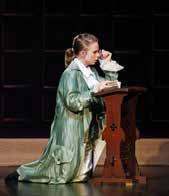




staging thus intensified the play’s dramatic moments, creating an engaging theatre experience.
From the moment the curtains rose, the audience was transported to the evocative world of 18th-century England, where the plight of abandoned children and the darkness of human greed collided with acts of profound love and resilience. The production’s brilliance lay not only in its rich narrative, but also in the stellar performances that breathed life into its characters.
Particularly mesmerising were the portrayals of Mish, beautifully played by Sugden, and Otis, portrayed by Megan P, who serve as the emotional linchpins of the play. Otis, with his chilling malevolence, was brought to life with such convincing menace that he left the audience shivering. Meanwhile, Mish’s journey from despair to redemption was delivered with heartfelt authenticity, evoking both tears and admiration in equal measure. The interplay between these two characters created an electric tension that lingered long after the final bow.
Alongside the leading cast, the play’s impact was significantly bolstered by the strength of its supporting ensemble. Characters such as the ambitious Alexander, superbly played by Alyssa, the stern Sir William, convincingly portrayed by Megan T, the gentle Melissa, lovingly played by Olivia, and the sinister Mrs Lynch, confidently brought to life by Shehrezad, each contributed to the play’s depth. These characters, and the actors who portray them, effectively conveyed a wide range of emotions - from the joy of musical expression to the depths of despair and cruelty that characterised the era.

Adding to the production’s emotional impact is the remarkable sound design and choral singing. The soundscape masterfully captured the play’s shifting moods, from the ominous undercurrent of danger to moments of transcendent beauty. The compelling choral performances, rich and immersive, elevated the story to a near-spiritual experience. Together, these elements underscored the emotional weight of the narrative, making Coram Boy an unforgettable piece of theatre.
The final, devastating death scene in Coram Boy was depicted through the lens of physical theatre, transcending mere narrative and becoming a visceral, haunting experience. Instead of relying solely on dialogue or conventional staging, the director orchestrated a symphony of movement, light, and sound to convey the profound loss and injustice at the heart of the story.
The production’s stunning visual and musical elements enhanced its storytelling power, making Coram Boy a truly memorable experience. It was a rare gem that combined social commentary with raw human emotion, leaving an indelible mark on its audience. A must-see for anyone who values the transformative power of theatre!
National School Theatre Awards
www.schooltheatreawards.com
@schooltheatreawards
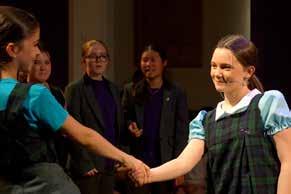



“This was one of the most enjoyable and exciting productions that I have ever done and I will never forget doing it.”

(Year 8)
“This show was absolutely AMAZING! I loved every minute of it; the singing was brilliant and Mrs Trunchbull was seriously creepy.”
Sidney (age 7, audience)



“It was really fun being involved behind the scenes co-ordinating the crew. It’s not the part of the production where I usually take the lead and I very much enjoyed working with the team of organised and hardworking crew. ”
Mrs Helen de Mattos

Harriette





“My mummy says I’m a miracle!” The opening line of the two sold-out shows, sung with rowdy charm, immediately drew everyone in. As tables adorned with cheerful balloons and celebratory cakes glided across the set, the atmosphere fizzed with anticipation for Matilda the Musical, Jr. With remarkable talent, Years 7 - 9 pupils transported us from the modest stage in the Hall to a world brimming with childhood rebellion and the limitless wonder of imagination.
The familiar narrative of Roald Dahl’s Matilda unfolded before us... We all know Matilda Wormwood; a young girl possessing an insatiable curiosity, a keenly intelligent mind and a spectacularly vivid inner world - a stark contrast to her truly awful parents. Emily (Year 9) delighted us with her performance of this wonderfully exuberant character, alongside Shreshta (Year 9) who played Michael, Anita (Year 7) as the hilariously horrid Zinnia in all her gawdy costumes, and Orla (Year 8) as the equally unpleasant Harry with swagger galore, completing the memorably dreadful Wormwood family.
Familiar characters also graced the stage and we were treated to fantastic performances by Carla (Year 9) as the chocolate-loving Bruce, Alice (Year 9) as the kind-hearted Miss Honey - with a demeanour and singing voice to match the sweetness of her nameand Liduo (Year 8) as the formidable Miss Trunchbull, who stalked the stage with draconian authority. Pigtailed Harriette (Year 8) was launched across the stage as Amanda Thripp and Sophie (Year 8) played loyal, humorous sidekick Lavender.
The pared-back set was brought to life with strategic pops of colour and the promise of playful chaos, from skipping ropes and scooters, to giant alphabet letters and the towering, tempting chocolate cake. The Art and D&T Departments thoughtful set design, the backstage crew’s smooth execution and the costumes team’s inspired choices tied everything together like a perfect bow - enough to make Miss Trunchbull retch.
The girls commanded the stage with an impressive presence, their beaming smiles reflecting the joy, challenge and deep friendships forged through the production. Our sincere gratitude extends to the Director, Mr Erik Anders, and Musical Director, Mr Patrick Martin, for bringing such a memorable and enriching experience to the School community, one that will undoubtedly leave lasting memories for when they grow up!
Musical
Life
French author Victor Hugo once said “Music expresses that which cannot be said and on which it is impossible to be silent”. In movies, music shapes the atmosphere of scenes and guides the emotional response of the audience; without music, even the most poignant moments on screen can feel incomplete.
Similarly, music has enhanced numerous events at Farnborough Hill throughout the year. One need only recall the Senior Choir’s spellbinding performance of Morten Lauridsen’s Sure On This Shining Night during the Senior Prize Giving ceremony to understand how profoundly music can move and inspire. At the summer Musical Soirée, the Junior Choir’s spirited rendition of the Medieval round Sumer Is Icumen In, with audience participation, was a joyful reminder of music’s ability to unite us.
Choral singing at Farnborough Hill has flourished this year. Our musical offering has been extended by the creation of two new ensembles: Staff Choir and Junior Chamber Choir. The latter has given singers in Years 79 the chance to engage with advanced repertoire and hone their choral skills; their progress throughout the year has been staggering.
The Music Department has had the pleasure of collaborating with the Drama Department on two productions this year. The Senior Play, Coram Boy, featured songs inspired by the music of George Frideric Handel; the emotive singing of the cast coupled with the quality of the live string orchestra brought intensity and historical resonance to the production. In the Junior Musical, Roald Dahl’s Matilda The Musical Jr., the sparkling vocal performances and energy of the cast were instrumental in bringing the characters to life.
Beyond the school gates, the Junior Choir were named best choir in the Under 15 category of the Woking Music Festival. Our choirs also had the privilege of singing Evensong at both Winchester Cathedral and Southwark Cathedral, experiences which pupils and staff alike will no doubt remember for years to come.
There have been numerous school events involving music throughout the year. In the Spring Concert, from the elegance of The Blue Danube by Johann Strauss II to the rock energy of Smoke On The Water by Deep Purple, every piece was inspired by colour. Another unforgettable highlight was the inaugural House Music event, in which every House wholeheartedly sang an ABBA song with heartwarming enthusiasm and camaraderie.
This year also marks a time of change as we bid a fond farewell to our singing teacher, Caroline Smith, and our brass teacher, Austin Pepper, both of whom are retiring after more than 30 years of teaching; we thank them warmly for the inspiration and guidance they have given to generations of Farnborough Hill pupils. We are excited to welcome Katherine Walker and Anthea Dwyer as singing teachers, and Andrew Nash as brass teacher from September 2025.
Join me as we delve into the highlights from another fantastic year of music-making at Farnborough Hill.
Mr Joe Adams Director of Music

Music Soirées are peppered throughout the School year and offer the perfect performance opportunity for pros and newbies alike.
On a Wednesday evening in February 2025, we had the pleasure of hosting a Musical in St Cecilia’s.
February’s Soirée featured Year 7 pianists Beatrix and Anita, both of whom were performing their first solos at Farnborough Hill; Beatrix played a beautiful arrangement of a Malay folksong, Voyage of the Sampan, and Anita performed a movement from Sonata in C Minor by Giovanni Battista Pescetti. We were also treated to a heartfelt vocal performance of Bruno Mars’ hit song Grenade by experienced Music Captain Tanishka.
The Summer Soirée saw more beautiful performances from a range of school ensembles, including Junior Chamber Choir, Orchestra, Rock School, and the Wind Band. There were also some inspirational solo performances: a moving rendition of I Dreamed a Dream sung by Norah (Year 8), the toe-tapping Transylvanian Stick Dance played by Sophia (Year 10) on saxophone, the virtuosic Tango en Skai played by Emma (Year 10) on guitar and a stunning performance of Don’t Cry For Me Argentina by Tegan (Year 10).
Other highlights included: the String Group’s rendition of Plink, Plank, Plunk!, which, in addition to extended pizzicato playing, incorporated comical squeaking on the back of the instruments; Keyboard Group’s rendition of Just the Five of Us! which featured five players sharing one piano; Junior Choir’s spirited performance of Sumer is icumen In, which included audience participation. The Swing Band ended the concert with an uplifting rendition of Ain’t No Mountain High Enough
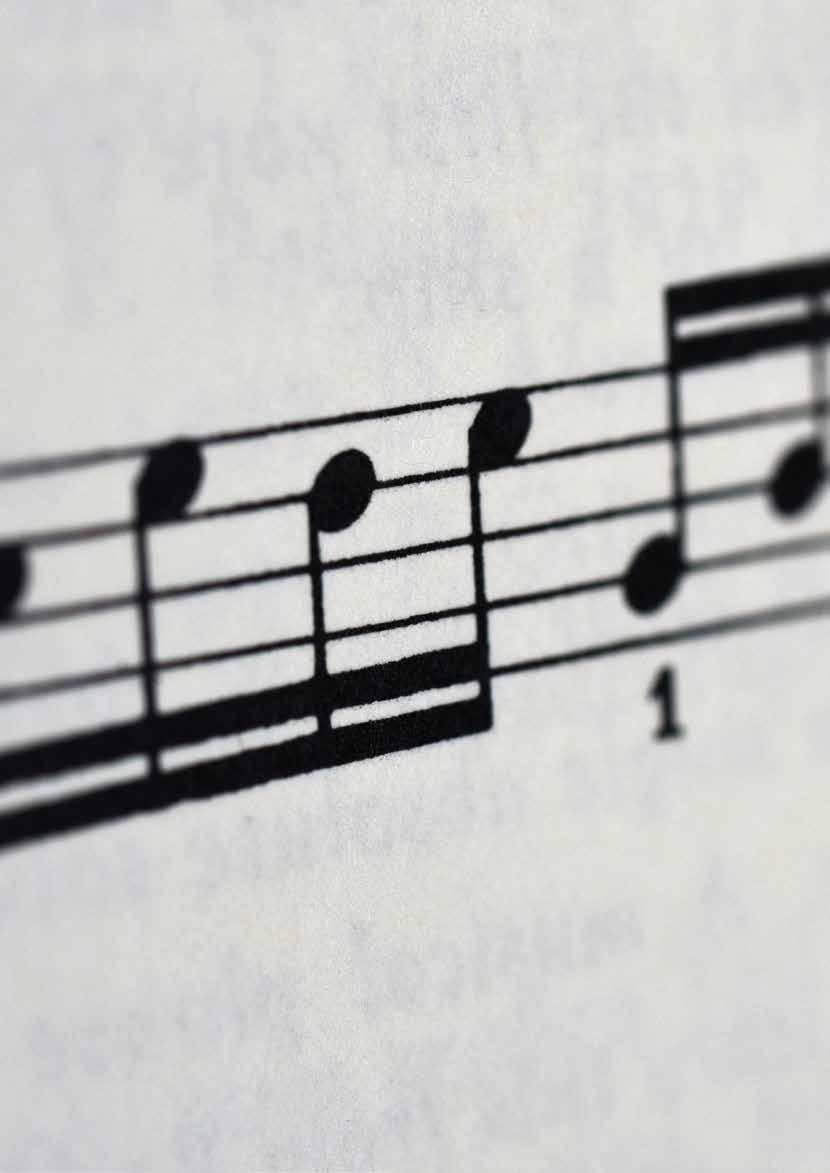

Well done and thank you to the pupils for their dedication to co-curricular Music throughout the year. Such events would not be possible without their hard work!

This year’s Easter Concert was called ‘Kaleidoscope’, and was themed around colours. The concert provided an excellent opportunity for each of the School ensembles to demonstrate what they have been working on this term. Pupils from every Year Group took part, and the concert also had a first performance from the Staff Choir, who performed a brilliant a cappella medley of Brain Damage and Eclipse (by Pink Floyd)! A wide range of musical styles were represented, from the Orchestra’s scintillating classical take on Smoke on the Water (by Deep Purple), to a well-crafted performance of The Blue Danube by the String Group. In addition to the ensemble performances, there were wonderful solo performances from Upper Sixth students Tanishka, Emma and Sarah, as well as Year 10’s Sophia and myself. The concert concluded with an emotive rendition of True Colours, sung by the Senior Choir. It was a memorable last concert with which to end my time at Farnborough Hill. Everyone who took part should be very proud of themselves.
Both the Senior and Junior Choirs had the privilege of singing Evensong at notable cathedrals, namely Winchester Cathedral and Southwark Cathedral respectively.
The Senior Choir’s service featured the rousing Evening Service in C Minor by George Dyson (a composer who spent much of his life in Winchester), and David Halls’ mercurial Preces and Responses Set Two. The anthem was Lift Thine Eyes, an unaccompanied three-part movement from Felix Mendelssohn’s oratorio Elijah. The service concluded with the organ voluntary Fantasy on Aus der Tiefe (Heinlein) by Kenneth Leighton, a piece based on the Lenten hymn Forty Days and Forty Nights. The pupils did an outstanding job; they shaped the music beautifully, their diction was clear, and there was an impressive sense of ensemble.
The Junior Choir girls had worked hard to learn settings of the Preces and Responses, as well as the Magnificat and Nunc Dimittis, which formed the backbone of their choral Evensong. Their ensemble skills were put to the test with the challenge of singing the psalm to an Anglican chant. This is often the hardest aspect of this service for less experienced choirs, so it was a delight that they were praised by the officiating minister for their clarity of diction in the psalm, allowing them to express the words meaningfully to the congregation. The service concluded with another highlight: a lively setting of the Easter carol Now the Green Blade Riseth, sung with a wonderful range of dynamics and excellent attention to detail by the Junior Choir.

Crikey, Moses! Crikey Year 7, what a finale to your first year at Farnborough Hill!
After the formality and ceremony of Junior Prize Giving and after just two weeks of rehearsals, the girls worked together to give a word and action-perfect performance that was both powerful and entertaining. Expertly accompanied by the band (and 50 kazoos!), the girls retold the story of Moses through some fantastic chorus and solo singing and some seriously jazzy moves!
The girls successfully portrayed a wide range of emotions in a short space of time - from the confidence of the ruthless and bold Pharoah, played by Abigail, to a thoughtful rendition of ‘Who’s that crying’ from Poppy as Pharoah’s daughter, accompanied on the violin by Beatrix, to their palpable exhaustion in the desert as they asked Moses to listen to their cries - before finishing with the toe tapping, bluesy headline number ‘Crikey Moses’.
Thank you to the creative team and to the whole of Year 7 for an amazing finish to a busy term.


Isobel (Upper Sixth)
Learning outside the classroom
Year 7 enjoyed a fantastic trip to Blue Reef Aquarium in Portsmouth to see first-hand the effects of pollution on our seas and aquatic life.
Ella said: “We explored the aquarium and saw axolotl, turtles, lobsters, stingrays and lots of other different types of tropical fish. We also saw a tank that was full of plastic bags that looked exactly like jellyfish and that

showed us the damage that they could cause. In lessons we learnt about how sea turtles are unknowingly eating these plastic bags thinking they are jellyfish and because of this the sea turtles are often harmed.
We also had a talk from one of the staff members at the aquarium, learning about how long different materials such as plastic, toilet roll and tin cans take to biodegrade, and discussing more eco-friendly alternatives to plastic that we could use in different scenarios. It was a great day and memorable to see in real life how we effect ocean life.”

Year 9 Geography pupils visited both the Natural History and Science Museums on an action-packed day in February 2025. Focusing on the Volcanoes exhibition in the Natural History Museum and later the Energy Resources exhibition at the Science Museum, the trip brought their learning out of the classroom and into a practical sphere. They also watched an amazing 3D documentary on whales’ experience of travelling to the Antarctic.
Year 9 pupils visited the Imperial War Museum to reinforce their knowledge of the Holocaust, which they had been studying in RE. This permanent exhibition tells the story of the Holocaust through personal stories, over 2,000 photographs, books, artworks, letters and personal objects ranging from jewellery and clothing to musical instruments.
Charlotte (Year 9) said of the trip: “The museum presented us with a very real, devastating perspective of the brutality of the Holocaust. The trip was very informative and emotional.”

Lower Sixth geographers visited the London Docklands as part of the ‘Changing Places’ unit in A level Geography, exploring the Docklands Museum, which highlighted information on Docklands regeneration from the 1980s to the current day. It was fascinating to learn some new facts about the regeneration scheme and see some remaining tokens from times past. After a quick lunch stop, where we were able to fully understand the wealthy demographic that now reside in the area, we then completed some Geography fieldwork as a practice for our NEA, including a questionnaire, field sketches, activity mapping, and decibel readings.
These sampling methods helped to give us an overview of how Docklands has changed, and are now a busy, impressive, exciting area.
Olivia and Freya (Lower Sixth)

Year 11 geographers spent a soggy morning knee-deep in the River Tillingbourne gathering data for their physical Geography fieldwork.

Year 7 went to the Winchester Science Museum and we had a blast! We started the visit by looking around all the crazy stations - there were so many different areas to see like the soundproof room, the building area,
illusion room and the giant guitar, as well as trying our hand at ‘build a bridge’ and the listening devices which delayed what we said. Of course, the Lego station was a hit, though its structural integrity proved no match for a simulated earthquake!
Our exploration continued until the planet workshop, where we learnt about the James Webb telescope and explored the science behind light reflection. The laser maze challenged our problem-solving as we needed to use the mirror pieces to reflect the laser and make it point into the rocket. After lunch we entered the planetarium which was like stepping into a movie theatre; we all learnt at least one new thing about the planets in our solar system as we virtually visited each one.
Elodie (Year 7)

Our trip to Bletchley Park, to find out about the secret code-breaking that went on there during World War II, was an incredible chance to see how Mathematics, quite literally, won the war!
We started the day with a workshop about the Enigma Machine and Morse code, in which we had the opportunity to crack some of our own codes and find out that John Cairncross was a spy! After a quick lunch break, we were off again on a guided tour, on which we learnt about how the facilities were run and what life was like for a code breaker and other workers at Bletchley. This part was particularly interesting as we learnt about some of the forgotten heroes from Poland who made the original designs for the Bombe Machine, which was used to crack the Enigma. We then had some time to do our own exploring and we looked at things such as Alan Turing’s office, found an area to try on some WWII style clothing and also explored Bletchley’s newest exhibition on the future of AI and codes.
Isla and Eleanor (Year 10)

Sixth Form Classics and Latin students had their book-based learning brought to life with an unforgettable trip to London to visit The British Museum, before watching ‘Oedipus’ at the Old Vic, staring Rami Malek!


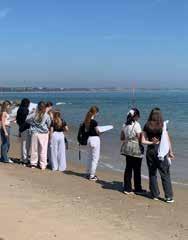

Year 9 classicists travelled to Bath to explore what happened in Aquae Sulis during the Roman period, and to delve into the history of this magnificent place and some of the extraordinary ancient artefacts still there.
On Monday 28 April 2025, we explored the Dorset coastline, visiting Barton-onSea, Highcliffe Beach and Hengistbury Head. During our trip we got the chance to view the effects of erosion on the local coastline and deepen our understanding of the concept of longshore drift. We were very lucky as on the day of our outing the weather conditions were exceptional. Our day concluded with ice cream and we had some time to reflect on our day and enjoy the views of the seaside. This trip was an excellent opportunity for both learning and fun, and we all truly enjoyed it.
Year 7 visited Bhaktivedanta Manor Hindu Temple to deepen their knowledge and understanding of Hinduism. It was an immersive experience where the pupils were able to observe Hindu worship first-hand and had the unique opportunity to hear a well-travelled Swami talk about his faith. The cultural immersion continued with a workshop on Hindu classical dance, a tour of the grounds with an ox cart ride, as well as time spent at the

cow sanctuary - a particular favourite! Lunch was a tasty pea and paneer curry and rice with chapatis and chips!
The afternoon was full of colour as pupils dressed in traditional saris and were adorned with beautiful face painting designs.
“A fun fact about Bhaktivedanta Manor is that it used to be owned by George Harrison, from the Beatles. Another fun fact is that all the deities have many outfits, and are bathed and washed every day!”
Alexandra (Year 7)
Our Politics tour of London began at the Houses of Parliament. We met our guide, Charlotte, who showed us around the various buildings on the Parliamentary estate before going into the two chambers, in which Charlotte told us in great detail about the processes of passing laws. The House of Lords was elaborately decorated with Victorian artwork and the historians amongst us were especially interested in the Prince’s Chamber, which depicted the Tudor Dynasty, as this is part of the History A level course. We also had the chance to enter the voting chamber to see how voting is managed, in both the House of Commons and the House of Lords.
We then walked to Covent Garden along Whitehall, passing 10 Downing Street on the way. We stopped for lunch before walking to the Supreme Court, where we had the chance to explore all three court rooms, even getting to sit in the chairs that the Supreme Court justices had been sitting in earlier that day. We also viewed their exhibitions, taking us through the landmark rulings of the Court.
We had some time to explore Oxford Street and Carnaby Street before dinner, and then we finally headed over to Victoria Palace Theatre to watch Hamilton. The story and the staging was very clever, and the singing was incredible. All of the musical fans among us loved it and it was a fantastic experience to end the day!
Eve (Lower Sixth)
Milana (Year 8)
Learning outside the classroom

Year 10 Food and Nutrition pupils visited the fantastic Tuppenny Barn to learn about growing and harvesting delicious, organic produce in a sustainable and Earth-friendly way.
The pupils enjoyed a tour of the farm which included a visit to the beehives and pond, before exploring the polytunnels, beds and soft fruit cages, in which seasonal fruit and vegetables are grown. They then demonstrated their budding chef skills in the kitchen classroom, preparing and tasting a variety of bruschetta toppings - a simple dish to allow the full, rich flavours of the handpicked, top-quality produce to sing out! Year 10 also took part in some menu planning, using the seasonal foods they had learnt about on their tour of the gardens. Every herb and plant presented an opportunity to learn something new. For instance, did you know the leaves of the fig tree are edible and have a tropical coconut flavour? You can shred them raw into salads, dry the leaves to make tea infusions or soak them to make a flavoured oil!
As a result of this trip, Year 10 are now ready to apply this valuable knowledge when planning their practical examination menus in Year 11 and in their own gardens at home.
Mrs
Mimi Fogden

Year 8 spent a day immersed in the Roman times at Butser Ancient Farm. From exploring a Roman Villa to looking at mosaics and artefacts, and even playing Roman games, they had a fantastic day bringing their Classical Civilisation course to life.
GCSE and A level design pupils visited Somerset House in London to absorb an international exhibition championing design in contemporary life and culture.
Pupils explored exhibitions curated by leading figures and institutions from the global design world. Inspiring innovation and creativity from the world stage of design, pupils were invited to examine work as cultural interpretations based on the context of ‘Surface Reflections’. During their visit pupils were able to engage with the work and gather research to inspire their own design work, both at school and beyond.

At the end of the school year, Year 9 pupils set off on a muchanticipated trip to Bubble Planet, Wembley, an immersive experience designed to spark creativity whilst honouring fun and laughter!
Upon entering the colourful, multi-sensory wonder that is Bubble Planet, pupils passed through a surreal sequence of rooms, filled with inflatable pools full of ‘bubbles’, colour changing clouds, mirror mazes and balloon rooms. There were shrieks of delight in the giant ball pit and plenty of photo-worthy moments in the infinity rooms and interactive projection spaces. They visited each zone and explored them with enthusiasm - there was a level of excitement that only comes from a long and hard-working school year!
The trip was a chance to let off some steam and celebrate a year of growth. A memorable end to a fantastic year!
Mrs
Kate Wood

Our Year 8 pupils had a fantastic time seeing the outdoor production of The Life of Christ in Wintershall. The day proved even more memorable with the lovely warm weather, which went well with the breath-taking outdoor scene.
Year 8’s end of term celebration was to the iconic Harry Potter World!
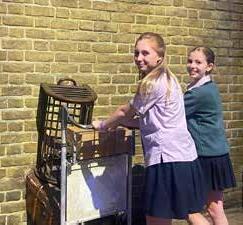
Mrs Rebecca Lowe

Desirable difficulty: the science of teaching and learning
Every new term launches with excitement and a full calendar. Take January 2025 as a snapshot: not only a new term but a whole new year. Only two weeks in and Year 11 and the Sixth Form had successfully completed their January Assessments, while Year 9 were making their pitches for our unique Empower programme and the next generation of Farnborough Hill Scholars had been into school to demonstrate their prowess not only in academic studies but in Art, Drama, Music and Sport. As it should be, it is fair to say that no one group of people has had quite the same start to the term.
For the staff, it began slightly before the majority of the pupils and provided a welcome opportunity to focus on the ‘science of teaching and learning’. Ably led by our guest speaker from Exam Study Expert, we were encouraged to think about the concept of desirable difficulty. Based on the work of Robert and Elizabeth Bjork, this notion asserts that our brain develops, and our learning advances, when we are challenged. In the context of teaching and learning, whilst re-reading notes, summarising topics, and highlighting key words might feel reassuring, reaffirming what we think we know, it is not until we test ourselves and force our brains to reach further and further back into our working memory to retrieve information, or to synthesise things in different ways, that we are truly making progress.
Of course, if the challenges are too great, our brain will shut down, we won’t achieve anything, and we will feel fed up, rightly so, but there is a sweet spot where we try to process material that is difficult enough to challenge us but not so overwhelming that it is a pointless endeavour. Like Goldilocks, we need our challenges to be just right.
We experience this not just in our learning. As we discover new styles of music, or forms of art, or even different cuisines, we measure what we hear, see or eat against an implicit horizon of expectations. Something that fits with what we know and like will be fun and pleasurable but we will quickly move on. Something that is so far out of what is often referred to as our ‘comfort zone’ will quickly be dismissed as too challenging. What is interesting is something with which we can immediately identify, but which provides us with something new, thereby advancing or modifying our horizon of expectation as we move forward.
We see it in other aspects of school life as well, whether that be in Drama, Music or Sport. We are not, or should not be, content to play a role that we have played many times before. Nor do we want to be embarrassed and feel underprepared. Instead, the joy and excitement comes when we find something that might at first feel unattainable but which ultimately we conquer and succeed at.
Returning to our learning, desirable difficulty is, of course, harder work. We are constantly questioning and challenging ourselves and this can seem daunting. If we get it right, however, it is also exhilarating to realise that brains can achieve more than we thought, recall more than last week, and ultimately take us to places that we didn’t think possible. One of the joys of my role is being able to dip into lessons across the School to see both teachers and pupils in action. One of the highlights of one particular week was in a Mathematics lesson where, amidst the quiet hum of earnest endeavour emerged a gasp, followed by the boldly uttered statement: ‘I’ve done it. I’m so proud of myself’. Learning which embraces desirable difficulty becomes an adventure: the challenges might be hard, but the rewards are great. On the basis of just the first two weeks of the Spring Term, it was safe to say that, in all facets of life, Farnborough Hill staff and pupils are all fully committed to being adventurous.
Dr Ian Taylor-Warwick, Deputy Head - Academic
from the Classroom

Year 8 pupils didn’t look too far for the inspiration for their Fine Art project - they created self-portraits, learning about shade and tone as they brought their faces to life.

Year 7 got stuck into plant reproduction! They explored the lavender plants on the Cloisters Lawn, observing them closely before bringing samples back to the lab for an in-depth look under the microscopes.
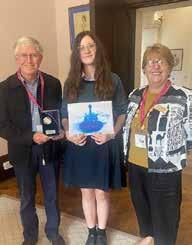

An Upper School Assembly at the end of January 2025 focused on the theme of forgiveness, with pupils taking the lead in exploring its meaning and impact. Year 10 pupil Tegan’s contribution was particularly powerful, as she shared a piece of her own writing, exploring the meaning of forgiveness and the complex emotions it evokes.


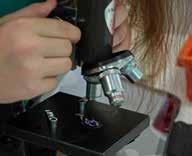


In the Summer Term, Charlotte (Year 9) and Maëlle (Year 11) each won the Local and District finals in their categories for the Rotary Young Artist Competition. The theme was Wonderful Water and both painters showed exquisite skill in their work. We also celebrated Sienna (Year 8) winning the Local and District finals for the Rotary Young Photographer competition, making it through to the Nationals where she finished third! Inspired by the theme, she captured an incredible image of a single droplet.



Upper Sixth biologists completed a kidney dissection as part of their A level studies during which they are learned about excretion and how the kidney helps to maintain a constant internal environment in the body.


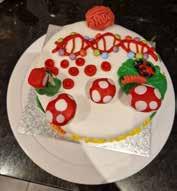
Year 9 pupil Lola reached out to the Queen of Shakespeare, Dame Judi Dench, as part of her research into her Year 9 Project Qualification, with the title ‘Why is Shakespeare so relevant in modern-day society?’. Good now, some excellent fortune! - Dame Judi replied!
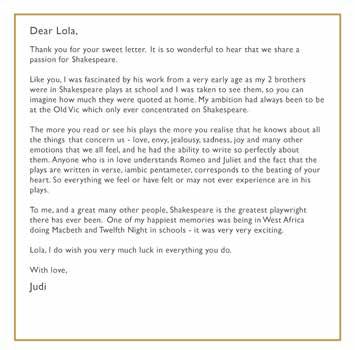
Year 9 pupils got hands-on with felt, exploring it as part of their ‘natural forms’ textiles project.


Year 8s Isla and Mary Jayne penned a sweet poem to the GCSE and A level candidates as public examination season 2025 began.







Biology Week in October 2024 saw girls participating in a Scavenger Hunt, a talk by a Zoologist from the Zoological Society of London (ZSL), a rat dissection, a brilliant photography competition and the ever popular and increasingly impressive Great Biology Bake Off!
Winners:
Biology Bake Off
• 1st Place - Tabitha (Upper Sixth)
• 2nd Place - Alana (Year 11)
• 3rd Place - Alice (Year 7)
Life on the Hill Photography Competition
• 1st Prize - Subhangi (Year 8)
• 2nd Prize - Carla (Year 9)
• 3rd Prize - Hannah (Year 11)
Conferences
Upper Sixth economists joined the Oxfordshire Economics Conference and explored ‘What do macroeconomists do?’. Students learned more about the current challenges facing the UK and how statistics prove an invaluable part in economic modelling and gaining a better understanding of economic problems.
The Sixth Form Mathematics students went to the Royal Institute in London for Maths Fest 2025 - an opportunity for us to learn about exciting and interesting areas of Mathematics, engage with a variety of puzzles and, in general, enjoy a day of Mathematics fun!
Inspiring and quirky talks on wierd and wonderful aspects of Mathematics included a talk on the (surprisingly in-depth) Mathematics behind the Rubik’s cube, and another where classic arcade games such as Pac-Man and Asteroids were used to illustrate ideas such as finding the most efficient routes and even exploring different map projections. They also heard how one speaker uses Mathematics practically to solve problems regarding crowd control, and another who took them back to Shakespearean England, explaining how people would have done Mathematics hundreds of years ago.
In between the morning talks, the Maths Slam was held, during which some students also had the chance to deliver a short presentation about an area of Mathematics that they find interesting, which this year included topics such as the Monty Hall Problem and infinity. Delivering Farnborough Hill their third victory in a row, Upper Sixth students Isobel and Eesha won with their vibrant presentation about the Four Colour Theorem!
Radhika (Lower Sixth)
On Wednesday 6 February 2025, Year 11 Latin pupils went to the Guildford Classical Association Latin GCSE conference in Chertsey to explore ‘Juno What?’. Throughout the conference we learnt about the context of Virgil’s Aenied alongside important themes and the characterisations of the gods. This really supported and solidified the knowledge that we already had, and added perspectives that we had not previously considered.
Georgia (Year 11)
Year 10 Separate Science pupils learned some immensely interesting science facts at Science Live!. From time travel really being possible, if very, very difficult, to rare beets and material science, the talks added an extra dimension to their GCSE course.
Sixth Form economists went to London for Economics Live: a chance for us to hear from experienced speakers about a variety of topics. We began the day with a talk from Vicky Pryce, in which she explained the importance of high productivity. This was followed by a more unorthodox talk by Dr Stephen Davies about global catastrophic risks, those dangerous events that could end civilisation as we know it; how economists might think about them; and how and why we should prepare for them. We were then taught the basics of trading on the stock market by Sophie Mclean, who used engaging games to show us her top tips to make money through trading.
After lunch, Stephen Millard gave a talk about unemployment in the UK in regard to COVID-19. It gave a lot of insight on how the UK labour market was affected in comparison to other countries such as the US. We finished the day with a thought-provoking talk from Ayeisha Thomas-Smith, encouraging us to question whether economists are really measuring the quality of people’s lives in the right way.
Radhika (Lower Sixth)
Sixth Form Religious Studies students attended a Candle Conference at the Bloomsbury Central Baptist Church. This conference featured the well-known British Theologian, Dr Peter Vardy, who delivered a lecture on the ‘Problem of Evil and the Existence of God’. This gave us a deeper insight into one of the central topics of our A level studies.
Molly (Lower Sixth)
Upper Sixth Business students visited Westfield, Shepherd’s Bush, for an enlightening and inspiring Grade Booster Business Conference. We met the legendary Jim Riley who led us through examination technique and top tips for hitting the A grade. The session included some timed calculation tasks, and we got to demonstrate both our accuracy and efficiency in using financial data.
Olivia and Eloise (Upper Sixth)






Guest Speakers
It was a pleasure to welcome Catherine Hynes (2018) back to the Hill for an after school ThinkTank talk on her journey to becoming a Vet. Since graduating from the University of Surrey, Catherine has spent the last year working at a small animal practice, a career she has dreamed of and worked towards since Year 9. Catherine shared her top tips and insider track information, in particular about making the most of the support available in school and studying hard but also making sure you have a healthy balance and ensuring you look after your mental health.
Dr William Durward, Clinical Phsychologist, delivered a ThinkTank talk discussing specific legal cases and the role of medical testimony in court. It provided a fascinating illustration of the intersection between clinical psychology and the broader criminal justice system.
Old Girl Zoyya Rizwan, who graduated from the Sixth Form in July 2024, returned to provide a fascinating glimpse about her experience so far with PwC’s Flying Start Degree Programme. She shared some valuable insights of the first of her four-year apprenticeship at the University of Reading’s Henley Business School. Zoyya also offered advice on the academic demands and practical benefits of a degree apprenticeship.
‘Ordinary Adventurer’ Bex Band spoke passionately about her experiences hiking the length of Israel and the impact that this had on her life. Having completed this adventure, Bex founded the non-profit organisation, ‘Love her Wild’. She encouraged us all to open ourselves up to new opportunities, to take the plunge and challenge ourselves. She reminded us of the importance of not giving up as we pursue our dreams but taking each day one step at a time. We all left the talk motivated to try something new and encouraged by Bex’s positive outlook.
Year 10 took the opportunity to attend ‘Careers Cafés’ to network and ask key questions of business professionals, such as ‘How do you go about securing a promotion?’, ‘What advice would you give your younger self?’, ‘What are some of the fun aspects of your job?’ and ‘What activities outside of work would you recommend to support your career?’.
Year 10 were treated to a live online event with the British Library and author Philippa Gregory to enrich their experience of creative writing in the classroom.
Gregory shared the genesis of her new book, ‘Normal Women’, explaining the research and creative process behind the novel. During the session, Gregory explored the ways in which the female voice has been marginalised in history and explained how these voices can be amplified through fiction.
Pupils were then guided to produce their own piece of creative writing inhabiting the viewpoint of an ordinary Medieval womanthere were some superb examples of creative storytelling which created fascinating entry points for continued work on English Language Paper 1.
New for this year’s careers offering were ‘Networking Breakfasts’ - a chance for our sixth formers to develop their networking skills and learn more from our Old Girls about the art of networking and the value it can bring to both our personal and professional lives. Our alumnae have a diverse range of backgrounds and industry experience and so were able to offer practical tips on building strong relationships and navigating professional settings with confidence. Key themes were the importance of active listening, asking thoughtful questions and following up after initial connections. Students were able to ask questions, gain practical tips and learn from first-hand accounts of how networking can open doors to exciting opportunities.
fuelpassionyour
Old Girl, Dr Rachel Andrews (1985) returned to the Hill to help prepare the next wave of aspiring medical students. Having completed her pre-clinical and clinical training at The University of Oxford and Imperial College respectively, Dr Andrews focused on paediatrics and ultimately became a Consultant in paediatric cardiology. She has worked as a Consultant Cardiologist at Great Ormond Street Hospital and is a Fellow of the Royal College of Paediatrics and Child Health. Dr Andrews now works as a Medical Advisor for an international Christian charity and very generously gave up her time to conduct mock interviews with five aspiring medical Sixth Form students.
Community


Community Feast Day
On Thursday 21 November 2024, our school community gathered to commemorate Community Feast Day, a special occasion honouring our founder, Abbé Louis Lafosse, and the Religious of Christian Education (RCE) order he established.
2024 marked the 207th anniversary of the RCE, a significant milestone since the day in 1817 when four young women, led by Mother Marie-Anne Dutertre, took their vows. The choice of this date was deliberate, coinciding with the Feast of the Presentation of the Blessed Mother. The RCE Sisters saw this as an auspicious moment to dedicate themselves to God and the education of young girls. Their unwavering commitment to girls’ education led to the founding of Farnborough Hill in 1889.
To honour this rich history, the day’s events included a solemn blessing of the Sisters’ graves, a thought-provoking Mass, and engaging entertainment that shed light on the life of Abbé Louis Lafosse. We reflected on his inspiring message to embrace life with joy and wholeheartedness and paid tribute to the RCE Sisters who have served Farnborough Hill. Many of these dedicated women have now moved away from Farnborough, but continue to pray for us from afar.
The School community was delighted to receive most generous gifts of sweet treats from the Sisters in commemoration of their Feast Day and we were so pleased to hear that they were equally delighted to receive beautiful flowers and cards, hand crafted by each Form.
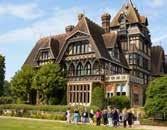




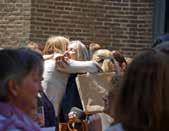

Tours on the Hill
To support our newly launched School Archive Collection Project, Mrs Katherine Bell and Ms Ailsa West have hosted a series of ‘Tours on the Hill’, engaging visitors with tales of our school’s rich history and its connection to Empress Eugénie.
The tours, culminating in a delicious afternoon tea in the Grand Salon, have been a resounding success. If you would like to come along to one, please get in touch with Ailsa West!
Heritage Day
As part of the nationwide Heritage Open Days scheme, Farnborough Hill proudly opened its doors to the public on Saturday 14 September 2024. The event attracted over 500 visitors keen to discover the rich history and heritage of our school.
Visitors explored the School Chapel, Refectory and Library and our beautiful grounds as well as the exterior of this special building. A dedicated team of staff and volunteers were on hand to share fascinating stories about the School’s past, from its inception as the home of publisher Thomas Longman to significant milestones in our own school’s history.
Old Girls’ Reunion
We had the pleasure of welcoming back over 200 Old Girls for our annual Reunion on Saturday 17 May 2025, from the Class of 1965 all the way to our recent alumnae from 2022.
The day included speeches from Mrs Maria Young, our Headmistress, and the President of the Old Girls’ Association, Miss Stephanie Dobbin. Stephanie presented the Outstanding Lifetime Contribution to Farnborough Hill Old Girls’ Association award to Mrs Gill Chapman, recognising her enthusiasm as both a former teacher and friend throughout her time at the School. We also held in our thoughts all the Old Girls who couldn’t be with us this year as we joined together for a service in the Chapel.
A scrumptious celebratory lunch, enjoyed in the Refectory, Grand Salon, Library or al fresco, was the ideal setting for lively conversations. Vivid memories of school days were exchanged and hearing everyone swap stories of their lives since leaving the Hill was so special. It’s always wonderful to see the strength of our Farnborough Hill community in action while reconnecting with the amazing women who make up our F’Hill family.
This year’s reunion was undeniably a day to remember for everyone able to join us, and the anticipation for next year’s event has already begun!
Farnborough Hill has been Highly Commended in the Best Experiential Learning category at the Muddy Stilettos School Awards 2025! This award is given in recognition of our Empower Day, a truly unique experiential learning initiative.

Through planning the workshops, Year 9 learnt valuable skills for life, including leadership, group work and time management. It was satisfying to see all our hard work come together and the jumpers covered in stickers; small hands holding prizes and smiling faces were evidence of everything we did to make the day a memorable one. Thank you to all the teachers for helping ‘Empower’ us and for everything you do every day. Now we know how hard it really is!
Sophie (Year 9)
Local Schools Outreach
Over the last academic year, our fantastic pupils worked with local schools to share a bit of the magic of a Farnborough Hill education.
Sixth Form students spent September and early October in 2024 devising a Matilda themed Musical Theatre workshop to take on the road to local primary schools. A total of ten workshops were delivered ensuring an afternoon of utterly revolting fun for numerous Year 5 pupils! This was a long-term commitment from our students, with the final workshop taking place just before May half term 2025.
In the Summer Term 2025, Mr Joe Adams and a handful of our talented musicians delivered musical Assemblies to two local primary schools, demonstrating their instrumental prowess and talking with passion about all the skills they have gained from learning an instrument (beyond the obvious!). Meanwhile, Mrs Katherine Bell, Mr Gavin Hawkins, Miss Hannah Collier and their Lower Sixth historians have welcomed Year 3 pupils from five schools to Farnborough Hill for a local history morning where they learned, through three hands-on sessions (including, of course, some dressing up!), what it would have been like to live at Farnborough Hill in the Victorian era. Needless to say, the life of the Empress was more appealing than the lives of her house staff!
Finally, our amazing Empower day, now in its third year, took place at the end of June 2025. Year 9 pupils took responsibility for welcoming and hosting over 150 Year 4 children from three local schools for a day of co-curricular activities based around three curriculum strands: STEM, Creative and Performing Arts, and Sport. Needless to say, they were phenomenal organisers, hosts and teachers for the day and the Year 4s (and their teachers) had a fantastic time with us.
It has been super to engage with local schools and children in a meaningful way, adding a little to their education while our girls have gained hands-on experience of project management and working with different age groups and all the skills that entails. We’re hoping to extend the Outreach programme further in 2025 - 2026!
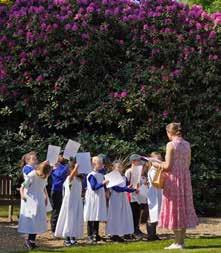

Co-Curricular

School is about much more than lessons – education does not stop at the classroom door! Throughout their time at Farnborough Hill, we want our girls to experience everything we have on offer, so that they leave us as the very best version of themselves and truly fulfilled. We are very proud of our extensive programme of clubs and activities: this is a very, very small snapshot!
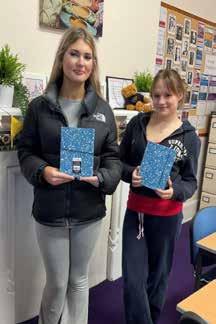
Over the course of the last four months, as part of Investor Club, we have invested £100,000 of virtual money with the help of our teacher Dr Tytko. With Dr Tytko’s advice, we soon started to enjoy using the London Stock Exchange portfolio simulator to buy and sell shares and other securities and invested our virtual funds in a portfolio of shares, bonds, funds and commodities.
Throughout our time we have learnt a lot about strategy and risk taking, often through trial and error. We are pleased to also report that our portfolios remained in positive territory and in profit - Emilia’s portfolio particularly excelled, to return £113,613 or 13.3% in four months, which exceeded the growth in the FTSE 100 index of 9.7%.
We have dabbled and bought shares in gold, premium shares such as Burberry (a star performer), technology shares including pharmaceuticals, as well as investment trusts and bonds.
Our experience has exposed us to the importance of researching companies and understanding geopolitical events, looking at trends and charts, reading the financial news and thinking about risk. It has been a thoroughly enjoyable learning curve.
Elizabeth and Emilia (Year 11)

Young Enterprise businesses spent an extremely busy day at the iconic Old Spitalfields Market in London, selling their wares to both the public and to mystery shoppers who judged various aspects of their businesses, from their merchandising to their sales techniques.


Getting market-ready takes months of hard work!

Our Junior Science Club had a fantastic time with some pond dipping! We explored our newly refurbished pond, identifying various organisms. The highlight of the session was the discovery of several newts - a wonderful sign of a healthy ecosystem!
Debating Club sent a team to the ESU Schools’ Mace Debating Competition in November 2024. Our team was up against Wellington College in round one, opposing the motion ‘This House would build homes on the Green Belt.’ Team Farnborough Hill worked brilliantly together, beating off the strong competition with superb reasoning, strong evidence, and confident delivery. Round two took place in January 2025, when we once again took on Wellington College. We debated the topic of ‘This house believes musical works should not be copyrightable’. On the opposition side, we debated against the motion using feedback from the previous round to help us perfect our art, and structure our arguments. Using both pre-prepared arguments and on-the-floor rebuttals, we engaged in half an hour of rigorous debate.
We very much enjoyed taking part in the competition and are sure our experience will lead to great things next year!
Alana (Year 11), Cecilia (Year 9) and Lola (Year 9)




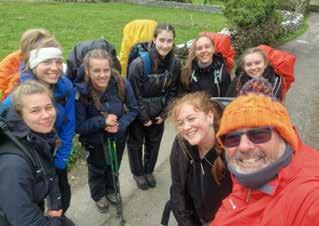
Despite sore feet, blisters, and a few tough climbs, we came away from Yorkshire not just having completed our Gold DofE Expedition, but with memories, friendships, and inside jokes that will last a lifetime.
DofE
In August 2024, we enrolled 75 girls for Bronze, 31 for Silver and seven for Gold.
In the Autumn Term 2024, the 31 Silver girls completed both their three day expeditions in the Peak District, and the seven Gold girls had their five day practice in the Dark Peaks over October half term, with their four day assessed expedition in the Yorkshire Dales during the 2025 Easter holidays. The 75 Bronze girls experienced a chilly two day March 2025 practice expedition followed by a much warmer assessed expedition in the North Downs in early summer. We have watched groups bonding, developing their skills and learning from their mistakes. Whilst some excel at navigation, others have excellent camp craft skills or are highly valued for keeping up morale.
In addition, they have completed around 2000 hours of volunteering, helping many youth organisations and clubs as well as community organisations. For example, one participant helped renovate the old Station Master’s house with a community organisation in North Camp, whilst another helped with an additional needs acrobatic class. Many of the girls have made a real impact with the organisations they have been working with and their commitment was greatly appreciated. It is always great to see participants try new skills and activities, taking themselves out of their comfort zones.
There have been some interesting physical activities, including rock climbing, kickboxing, rowing and sculling, acrobatics, synchronised swimming, subaqua and snorkelling and Choi Kwang Do!
For the skill section we have encountered baking, crochet, music climate warriors, taiko ensemble (synchronised Japanese drumming), car road skills and car maintenance and many more. I was delighted to see car maintenance, not just because it is an excellent skill to develop but also because that was my choice of skill many many years ago when doing my Duke of Edinburgh’s Award.
We wish the participants congratulations for all that they have achieved, and hope that they will continue to embrace new activities and challenges.
Huge thanks to the staff who have given up their time to support the participants including Mr David Earles, Mr Crispin Ingham, Miss Georgina Bouzyk, and most especially to Mrs Hazel Burrows for her co-ordination of the Bronze and Silver expeditions and the celebration evening. We also thank the amazing Mrs Melanie Mitchell for her efficiency and support in all things admin, and Mr Craig McCready for double checking our risk assessments. And we cannot forget to thank the Sixth Form students who have shared their passion for their award with parents on Open Days, in particular Bethan, Sugden and Jennifer.
Mrs Georgina Brocklehurst, DofE Co-Ordinator

Olivia (Lower Sixth)
Co-Curricular Greenpower
Members of the Greenpower Club fulfilled a dream not once but twice this year, having the opportunity to race their lovingly built creation at some of the world’s most iconic race tracks!
For the past two years, our Greenpower team has designed, developed and tested two fully-electric racing cars. Not only have we wired the chassis, mounted aluminium side panels and created an efficient braking system on the new car, we have also made many improvements to our original car - ‘Lightning McBee’. Our main modifications were improving the accelerator mechanism to reduce battery drainage, attaching a more efficient speed controller and reshaping our bonnet to be lighter and more aerodynamic.
Eleven members of our team set off from school bright and early at 6.00 am, on a Sunday in April 2025, to travel to Goodwood’s 4km motor circuit. Mr Rees carefully drove our two electric cars, artistically strapped onto both vertical sides at the back of the van. Both cars successfully passed through the meticulous scrutineering, even after mounting our wing mirrors on the day with minutes to spare. With tyres pumped, we pushed our way onto the track. After the practice lap, all cars lined up in their allocated positions, noses poised over their lines and beeping their piercing horns. Suddenly, the Union Jack flag was waved and all drivers pressed on their accelerators and a gradual but steady increase in speed followed. Within moments, everyone swerved in and out of each other’s lines out to the front, side and behind; taking the racing line to overtake competitor cars.
Arguably, the pit stops were the most challenging part of the race for us. In one incident, we had left Shawna (one of our drivers) at the top of the pit lane for a solid three minutes, thinking that she was still halfway around the circuit on her last lap!



With fifteen minutes left of our second race and with us steadily creeping up the rankings into 18th position, a red flag was waved by the marshals and all electric cars came to a halt. Two recovery vehicles then hauled two electric cars off the track (thankfully not ours) and with that the race terminated. As our rattling cars completed their tenth lap, they trundled back to the pit where we left Goodwood sun-kissed and fatigued, achieving a new best lap time of 6:06 minutes and ultimately finishing 20th out of 40.
Maria (Year 11)
On Sunday 1 June 2025 our newest Greenpower race team members experienced their first thrilling race day at Castle Combe. Teamwork was shown in abundance by the girls, quickly setting up the event shelter and organising the tools and batteries for the car upon arrival. Seeing the pupils across Year 8 to Lower Sixth working together effectively is a true joy of running this club.


During the safety checks, the scrutineers commented on how well-built the Farnborough Hill car was and gave us a few hints on how we might further improve our efficiency. The whole community was welcoming, and the girls were able to inspect the differing approaches other teams had implemented to develop their car’s performance.
Whilst the day itself was long, with the minibus leaving school at 6.00 am, the girls were in good spirits throughout and successfully completed more than 30 laps of the 1.85 mile course.
As we approach our final race of this season in September 2025, we are hoping to install monitoring systems into one of the cars, to better track the electrical efficiency and battery performance with real-time data. This system will require the girls to use their mathematical, scientific and programming knowledge from the classroom in a real-world setting.
Mr Alan Rees, Head of Science

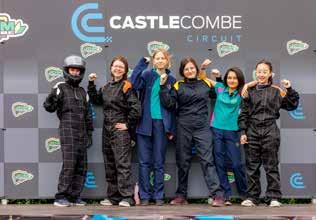
CHALLENGE:
When you start to feel that life is a little out of balance, take a few minutes to consider each of the five pillars. Is there one that you haven’t spent enough time on recently? How could you rebalance that?
F’Hive Ways to WELLBEING

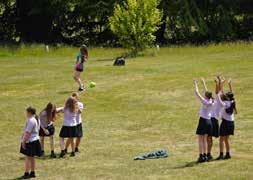


We are so grateful to the Farnborough Hill Friends for their ongoing support of our wellbeing programme. As well as funding our annual subscription for The Wellbeing Hub, they have also provided wellbeing boxes for our pastoral spaces around the School and big boxes of outdoor games for the girls to use during break and lunchtime.
You could be forgiven for thinking that our word for the year this year was wellbeing. It has, after all, been everywhere. From wellbeing boxes around the School and the expansion of our team to include a Wellbeing Support Officer from September 2025, and from our refurbishment of St Luke’s to create a permanent wellbeing space to forging ahead with our aim to achieve the Children’s Bureau Wellbeing Award, the Farnborough Hill community has focused on its wellbeing, and we are much stronger as a result.
Embedding wellbeing into our school culture is not just beneficial, however - it is essential. It lays the foundation for a positive educational experience and prepares pupils to thrive in all areas of life. At Farnborough Hill, we are more than just individuals; we are a community united by faith, learning and care for one another. When wellbeing is nurtured across the whole community, everyone benefits.
Our ambition is for wellbeing to be seen as a significant strength of Farnborough Hill in a society that is increasingly challenging for young people (and their parents) to navigate successfully. We are transparent about the holistic, balanced approach we take with our pupils not only to create an environment in which all members of our community can thrive, but also to ensure that they leave Farnborough Hill having fulfilled their potential and able to face their future with wisdom, strength and dignity.
Whilst remaining pupil focused and community-led, we build our wellbeing work around the five ways to wellbeing:
Connect - build strong relationships with the people around you
Be Active - engage in physical activity that you enjoy
Take Notice - be curious; notice the world around you and savour the moment
Keep Learning - challenge yourself with new experiences and skills
Give - perform acts of kindness and contribute to others
For those of you for whom these are new, the broad concept is straightforwardyour wellbeing is positive when you are feeling good and functioning well, and if you have all five of these elements in balance in your life, your life should be in balance.
Whilst it is arguably a piece of work that will never be truly ‘done’, our criteria for successfully promoting wellbeing throughout the community includes:
• A community that is fluent in the language of wellbeing.
• Pupils who feel empowered to take control of their own learning and wider school experience.
• A staff that is not only confident and qualified to support their pupils inside and outside the classroom, backed up with a strong resource base and regular training, but also a staff who feel confident to advocate for themselves when they need to.
• Parents who feel equipped with everything they need to raise their successful, happy young woman.
As you read through this magazine, you will see a myriad of ways in which our girls (and our staff and parents!) have lived out each of these pillars, but far from becoming something formulaic and predictable, our aim is that the pillars become part of our framework - a prompt, to encourage people to think about the things in their life that are important to their wellbeing and to prioritise that in their daily lives, or a provocation to develop an area that is perhaps less present but would add significant value to their daily life.
Mrs Laura Evans-Jones, Interim Deputy Head - Pastoral



Extended Learning
What does Extended Learning look like at Farnborough Hill?
I am often asked by prospective parents, ‘what actually does extended learning involve at Farnborough Hill?’; the most dichotomous of questions in my opinion. On the one hand, I can reel off the many amazing clubs, activities and events held throughout the year designed to actively encourage our pupils to learn new skills beyond the taught curriculum. But, on the other hand, extended learning is much more of an approach to learning, the adoption of a new mind-set, a space whereby our pupils are encouraged to grow and challenge themselves. Now this could be through a particular club or activity but it is also developed much more organically through the development of a culture of love for learning, the encouragement of a pupil within lessons by suggesting a new documentary series which they may be interested in. Therefore, it is almost impossible to accurately pinpoint what extended learning might look like for our pupils. There is no ‘cookie-cutter’ model of what a typical extended learning program might be for a pupil but instead an amalgamation of a whole range of different activities, events and resources for pupils to curate and shape their own learning beyond the classroom. I hope the launch of the new Extended Learning Booklet on our website will help give more of a flavour of how varied the world of extended learning can be.
So what has been going on within the Extended Learning Calendar in 2024 - 2025?
Our AfF-Hilliation programme has been abuzz with activities designed to challenge the girls in a whole host of ways: the Year 11s had a go at combining their creativity and engineering skills in the ‘egg drop’ challenge whilst the Year 10s were treated to an insight into critical thinking. The Sixth Form group became
detectives for the afternoon, competing against the clock to uncover the mystery of a burglary in a jewellery store on Saint Marie and the youngest scholars took part in a mathematical relay challenge during Math’s Week, with sweet prizes up for grabs for the fastest.
In November 2024, pupils were treated to a talk by the ‘ordinary adventurer’ Bex Band on her amazing, and often wacky travels (anyone fancy scootering the length of the USA?) and how these experiences have culminated in the development of an online community encouraging women to explore the great outdoors. She encouraged the girls to consider the many and varied directions life can take us, and to encourage us all to consider treading on the path least explored every now and again. Another highlight of the year was when Dr Sarah Tobin, anthropologist, came to deliver a lecture on origins of the Middle East Crisis. The girls found this talk highly informative in helping to piece together some of the complexities of this ongoing conflict, and really helped give some context behind the current escalation.
My favourite time of the School year is when the Project Qualifications come to the end. Yes, there is a big sigh of relief from the girls at having completed their qualification but for me it means that I get to read the amazing essays produced by the girls and see how their confidence in conducting research and working independently has grown. I am always in awe of where the girls get their titles from and wondering whether this piece of research undertaken in Year 9 or Sixth Form might just be the start of a journey of academic discovery taking them to University and beyond.
It really has been a remarkable year, but I am certain that 2025 - 2026 will be bigger and better than ever!
Mrs Hannah Van Klaveren, Extended Learning Co-Ordinator
‘The hallmark of successful people is that they are always stretching themselves to try new things’
Carol Dweck
Focus on STEM...
Year 7: In our AfF-Hilliation Science session, we played with fire by spraying different salt solutions into the flame of a Bunsen burner, creating an array of beautiful different coloured flames. I learnt how this was connected to the structure of atoms and electrons in different types of salt.
Anita (Year 7)
Year 8: In our Science AfF-Hilliation we explored one of Mrs Macey’s favourite experiments: colour change! Mrs Macey taught us about universal indicators and the ions in acids and alkalis. We then did a practical where we tested different indicators in water, acid and alkali, recording what the colour change was. This was extremely fun and useful for future lessons.
Oluwasemilore (Year 8)

Year 9: In AfF-Hilliation, we discovered how Mathematics and Physics can make amazing patterns. We started by drawing a triangle and putting a dot somewhere inside it. Then using a die, we picked one of the triangle’s corners and drew a new dot halfway between that corner and our point. As we kept repeating this, a pattern started to appear and it was called the Sierpinski Triangle. Mr Rees also showed us how a computer could do the same thing thousands of times using Excel. We even looked at something called the Barnsley Fern, another cool pattern made in a similar way. In the end, we were surprised by how something random could lead to such interesting shapes!
Ananya (Year 9)
Maths Week
March 2025 brought the first ever Farnborough Hill Maths Week!
It began in Assembly with Upper Sixth students Eesha and Isobel sharing their brilliant winning Maths Slam (from the Maths Fest conference) on The Four Colour Theorem. This was followed by Emma and Radhika (Lower Sixth) who spoke about the rationale behind Maths Week and how Mathematics builds skills such as problem-solving, critical thinking and resilience, skills required well beyond the Mathematics classroom.
We had a range of fun co-curricular activities at lunchtimes throughout the week, including tangram puzzles, tessellations, code breaking, countdown and a cross number scavenger hunt. Pupils also took part in puzzles in the Library and had the opportunity to read books such as Murderous Maths and Humble Pi.
On the Thursday, Years 7 - 10 enjoyed some fun and engaging Mathematics sessions with our visiting author and speaker Rob Eastaway. Rob won the Zeeman medal in 2017 for excellence in the promotion of Mathematics and has written / co-written 20 books. The girls had great fun playing a game of Greed, which saw Rob losing money to one of our Year 10 girls!
On the final day, pupils took part in our annual Pi Day Scavenger Hunt, where they found clues and solved puzzles around the School to create the digits of Pi before we enjoyed various versions of Pie at lunch, from fish pie to apple pie!
We look forward to making Maths Week a permanent annual fixture in the Farnborough Hill calendar.





Year 8 Emily and her fellow pupils challenged the teachers with a Maths Game Show, which saw ‘Bright Sparx’ Mr Alan Rees and Mrs Jessica Hocking crowned victorious!
Globe Trotting


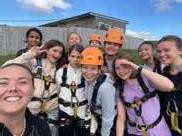

Year 7 PGL
Year 7 cemented friendships on their October 2024 residential. Beatrix and Anita reported on an adrenaline-fuelled few days:
‘PGL Osmington Bay, Weymouth was amazing! Every moment from the coach trip down (and the heartfelt rendition of Let It Go) to the less energetic (read: sleepier!) journey back was packed with fun and adventure.

Our activities included Jacob’s Ladder, Laser Tag and an absolutely massive zip wire! We enjoyed an epic game of ambush and Dragon Boat Racing, and had a brilliant campfire evening with lots of singing and dancing and marshmallows! Then there was Survivor, where we ran around getting muddy, building shelters and lighting fires.
Axe Throwing and having a go on the giant swing on the final day completed a brilliant trip. A big thank you to all the staff at PGL that made our stay memorable and our teachers, especially Mrs Balsom, for organising our trip.’
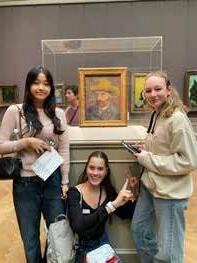

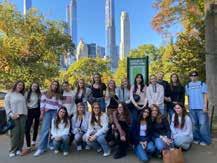

New York City

GCSE and A level artists explored The Big Apple over October 2024 half term! Rose (Year 11) summarised the trip:
“We were blessed with summer-like weather and we stayed in the heart of Times Square at a beautiful Art Deco hotel called Hotel Edison, setting the perfect backdrop for our adventure.
Our first morning started with a true taste of New York: fresh bagels! After breakfast, we strolled through Central Park, soaking up the scenery. The day continued with visits to two incredible museums: The Met (Metropolitan Museum of Art) and the Guggenheim Museum. That evening, we enjoyed dinner at the Hard Rock Café before heading to a Broadway theatre to see the iconic Wicked - a show that wowed us all!
Throughout the trip, we immersed ourselves in the city’s culture and art, such as the wonderful graffiti workshop in Brooklyn where we all learnt about the art of graffiti and took part in some spray art ourselves, and then we visited the MoMA (Museum of Modern Art) for even more art!

A highlight was our boat trip to Liberty Island, where we admired the Statue of Liberty up close, followed by a stop at Ellis Island. Some of us even discovered our own family names on the walls of the immigration museum. We also took time to visit the 9/11 Memorial Museum, where we learned about the events and impact of that day.”
Holland Sports
Years 8 and 9 sport stars had a fantastic week in Holland on a Hockey and Netball tour. An inspiring balance of coaching, competitive games and action-packed down time (Cave Bouncing, Tobogganing and Laser Tag!) ensured the girls not only developed at their sport, they also thoroughly enjoyed the opportunities to strengthen team bonds. We’re sure their memories will last a lifetime… especially of the karaoke!


Our adventure to Germany in December 2024 was a trip I will never forget, with so many new bonds and friendships made along the way.
Our coach journey involved a very early start (and lots and LOTS of sweets to keep us energised!). However, by the time we got to the Youth Hostel, we were absolutely exhausted so after a delicious dinner, we went straight to bed. The next morning we woke up in joyful spirits, excited for the day ahead. We made our way to Cologne Cathedral and were shocked with how dark and unsettling it looked in real life! We climbed to the top of the Cathedral, which, as you can imagine, had an almost infinite staircase and spectacular views. Afterwards we headed to the local Christmas market (the first of many) and bought a few fun souvenirs and Christmas gifts. The next morning, we headed to the Lindt museum, where - surprise, surprise! - we all indulged in some delicious chocolate!


Over the course of the next few days, we explored several more festive markets, took millions of photos, shopped a bit more and also got in some language practice. It was a fantastic trip and one which we won’t forget (partly thanks to the sheer number of souvenirs!).
Science in Geneva German Markets
Sophie (Year
8)
Lower Sixth students Emma and Anna, along with their peers, spent part of the Easter break in 2025 exploring the sights around Lake Geneva, including a lively treasure hunt around Saint-Pierre Cathedral and its impressive interior, and a scenic ride across the lake on Geneva’s Mouettes (water taxi) to the History of Science Museum. They said: “The highlight, of course, was our visit to CERN, where we found ourselves participating in interactive science activities and learning about the groundbreaking work at the Large Hadron Collider (LHC), including an engaging presentation on the Proton Express. Back on the buses, we paused at the poignant Broken Chair before our guided tour of the United Nations Headquarters, where we even had the unique opportunity to observe an active human rights session”.



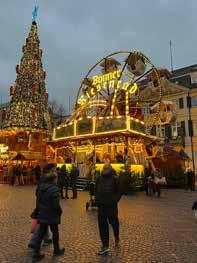

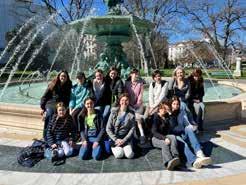


GLOBE TROTTING
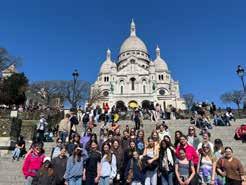
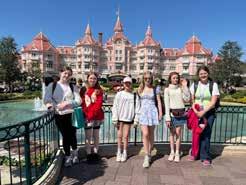




MFL in Paris
Early on Monday 7 April 2025, 29 excited pupils and three teachers set off on their French adventure which included crepe-making, croissants and the incredible Sacré-Cœur! We also climbed the Eiffel Tower, took a boat trip along the Siene, strolled the Champs-Elysées, and visited the nearby town of Brie Comte Robert to explore, browsing its market stalls brimming with souvenirs, French delicacies (especially cheese!), and a lovely sweet shop.
Wednesday was arguably the best day, as Walt Disney Studios awaited! We split into groups to experience rides like Aladdin’s flying carpets, Ratatouille and Cars. Lunch brought us back together before we headed into the main park, discovering the iconic castle, the famous Disney pizzeria and numerous merchandise shops. There were so many fun rides at this park and our favourites were Indiana Jones and Hyperspace Mountain. Unfortunately our day then came to an end but we left the park with lots of memories (and merch!).
It was an incredible trip.

Millie, Ella and Olivia (Year 7)
Italian Adventure



Our Italy trip kicked off on Tuesday 1 April 2025, with a late morning arrival in Naples. We jumped right in with a delicious pizza for lunch, then spent the afternoon at the archaeological site in Bacoli.
On day two, we enjoyed a guided tour of Pompeii. It was amazing seeing the Houses of Octavius Quartio and Menander first hand - both places we’d studied for our GCSEs. We also saw other Roman villas, the impressive amphitheatre and the Stabian Baths. For lunch we were offered the choice of pizza or pasta in Pompeii, followed by free time to wander the streets, visit the forum and even observe an insula being excavated! That evening, we had dinner at the hotel before heading into Sorrento for some shopping and gelato!
On day three, we visited Mount Vesuvius and took a guided tour of Herculaneum which included the House of the Wooden Partition (another highlight of our studies!), followed by lunch. The weather was lovely and allowed us to see the volcanic crater and take in some extraordinary views of Pompeii and Naples. Our final evening included dinner at the hotel and another enjoyable trip into Sorrento.
On our final day, we visited the National Archaeological Museum of Naples, home to a stunning collection of statues. Afterwards, we made our way to the airport for our flight back to England, filled with memories of the most amazing and fun experience!
Thank you to Ms O’Laoire, Ms Landowski and Mr Maccherini for a fantastic trip!
Eve, Emily and Freya (Lower Sixth)
south african sports
From the moment we landed in Cape Town, the adventure began. Our first stop was the historic township of Langa, where pupils jumped straight into a spirited game of Hockey and Netball against a local team. The match was followed by a guided tour of the area, offering a powerful insight into the history of South African townships, apartheid, and the resilience of the local communities. Pupils admired vibrant street art, chatted with local children, and enjoyed a delicious home-cooked meal accompanied by traditional South African music. Spirits were high as they joined the band for a sing-off and spoke with the warm-hearted host who prepared the feast.

The next day brought a bucket-list experience: a coach ride to the iconic Table Mountain. Climbing to the summit, the group soaked in breathtaking views and created lifelong memories. From off-road trails and scenic photo spots to encounters with mountain wildlife and a refreshing ice-cold slush, the day was unforgettable. Energised and united, the teams headed into their second match against Pinelands High School.
After a swim in the pool (with Table Mountain as the backdrop!), a hearty meal, and a restful night, the group was ready for more fun. High winds prompted a spontaneous change of plans, leading the girls to Ninja Warrior - where they bounced, tumbled, and swung their way to exhaustion. Special shoutout to Mr McGuire for his impressive standing flip - who knew we had a gymnast among us! That afternoon, fuelled by traditional Bobotie, the Hockey team took on Belville High School and secured a resounding 5–0 victory.
Later that evening, a dip in the sea raised eyebrows among locals bundled in coats and hats. But nothing could dampen the pupils’ spirits as they played Ultimate Frisbee, tossed a ball around, and simply relished being outdoors. Smiles and laughter were everywhere.

The next morning brought surfboards and sunshine. Pupils embraced the challenge of surfing with determination and enthusiasm - true Farnborough Hill spirit! With waves conquered, they were ready for their next match against Reddam Constantia, where both teams celebrated well-earned wins. One final night at Hotel Sky, and it was time to fly across the country to Pretoria.
Once settled, the girls wasted no time in meeting the neighbours - lions, giraffes, cheetahs, and majestic buffalo. The sunset that evening was nothing short of magical. The following morning, they visited the Winnie Masabo Foundation, an experience that can only be described as once-in-a-lifetime. Welcomed with song and dance, pupils threw themselves into teambuilding games (musical chairs was a clear favourite!), finger painting with preschoolers, Netball with foundation staff, and even learned a new dance - culminating in a fantastic dance-off. It was a morning filled with enjoyment, connection, and meaning.
An afternoon lightning storm unfortunately cancelled the final match against Redhill, but it gave the group a chance to relax, reflect, and enjoy each other’s company before heading to Mabula Game Lodge. Dusk and dawn game drives offered unforgettable sightings of the Big Five - lions, leopards, elephants, rhinos, and African buffalo - plus crocodiles, hippos, zebras, and exotic birds. Our final night together was one we’ll never forget. Gathered as one big group, we shared stories, laughter, and tears as we realised the tour was coming to an end. But what a journey it was - every bucket-list experience ticked off. We couldn’t be prouder of how our pupils conducted themselves. Compliments flowed wherever we went - not just for their sporting talent, but for their kindness, enthusiasm, and care for one another. Thank you for being part of this unforgettable tour and for the memories we now all hold dear. It was a trip that brought our teams closer together - on the pitch and beyond.
Team South Africa 2025 - what a legacy!






Cambodian Expedition GLOBE TROTTING
Spending eighteen days in Cambodia redefined what it truly means to visit a country. The expedition encouraged us - eight Sixth Form students and two teachers - to not simply observe, but to participate, approaching a new environment with openness and curiosity. Standing at the departure gate in Gatwick, none of us could have anticipated just how rewarding the following weeks would be, filled with challenge, growth, and unforgettable experiences.
Arriving in Phnom Penh, we were immediately struck by the intensity of the city. Road markings appeared to be little more than suggestions, with cars, mopeds, bicycles and tuk-tuks zigzagging around our bus. In that moment, as we watched the chaos unfold outside our windows, we began to realise just how far from home we truly were. It was a feeling that was both exciting and daunting, a sharp shift from the familiar into the unknown.
On our very first day, we set out to familiarise ourselves with Cambodia’s past, visiting the Killing Fields. We walked past mass graves, narrated by a survivor of the horrors that occurred there, and saw the memorial stupa filled with the skulls of victims, a quiet but unflinching testimony to the brutality of the Khmer Rouge regime. The experience was deeply sobering. What struck many of us was how such extreme violence could occur in such recent history and how it had been systematically hidden from much of the world at the time. It was a powerful reminder that atrocities on this scale are not confined to the past. There was also the realisation that many of the people we met that day had lived through the genocide themselves. A visit to the ornate Royal Palace later offered a striking contrast, highlighting Cambodia’s rich cultural heritage and traditions.
The heart of our trip was the project work. Staying with generous homestay families, we became part of the community, sharing meals (lots of rice!), learning practical skills like bricklaying and gardening, and most memorably, teaching English to local children. Their enthusiasm and smiles made every lesson unforgettable, and saying goodbye was incredibly emotional.
Outside the project, we enjoyed simple but meaningful moments: fishing (harder than it looks), walking through rice fields, and laughing together with our trip mascot, Clark, who joined us for everything from temple climbs to reflective evenings.
One of the toughest but most rewarding parts of the trip was our trek through the rainforest near Chi Phat. Led by local guide Khom, we battled mud, bogs, rain, and mosquitoes, and slept in hammocks under the stars. Despite the challenges, the trek brought us closer together. From “boggy beats and ballads” to quiz nights, we found joy even in the hardest moments.
Siem Reap offered a more modern side of Cambodia, with rooftop pools, bright lights, and food ranging from traditional Khmer dishes to hotdogs and burgers. But the real highlight was Angkor Wat. The breathtaking temples, some entwined with massive tree roots, felt like something out of a fairytale. Climbing to the top for sweeping views was unforgettable. And of course, tuk-tuks became a group favourite. There’s nothing quite like zipping through Cambodian streets with the wind in your hair, an experience so loved that some of us joked about arriving at our weddings in one!
Beyond the sights and adventures, the trip taught us practical and personal lessons. We learnt to budget, haggle (a skirt dropping from $25 to $4 was a big win!), and adapt to new challenges. More importantly, we grew as a team and as individuals, building leadership, resilience, and a deeper appreciation for the world around us.
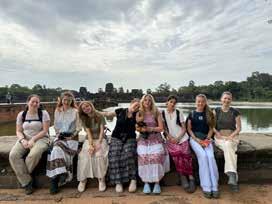

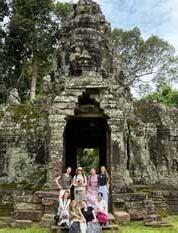


On our final night, we enjoyed a celebratory meal, reflecting on how much we had learned and changed. This trip was more than just travel; it was a life-changing experience. We are deeply grateful to our leader, Mike, and our teachers, Miss White and Mrs Hocking, for guiding us through it all.
We will forever cherish our time in Cambodia, and as the Cambodia Crew, we know we’ll carry its lessons, laughter, and memories with us for the rest of our lives.
Liv (Lower Sixth) and Zoe (Upper Sixth)





Spiritual Life LOURDES PILGRIMAGE

“The experience was very fulfilling, especially seeing the impact we had on the pilgrims and how something as simple as singing or face painting with them could bring such a big smile to their faces.”
Niamh and Naeve (Lower Sixth)




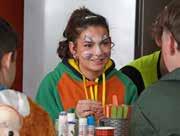
This year marked a significant milestone for Farnborough Hill as five of our Lower Sixth students, Mrs Nelle Dalton and myself set off on Easter Sunday 2025 for our inaugural HCPT (Hosanna House Children’s Pilgrimage Trust) pilgrimage to Lourdes. Joining forces with the wellestablished pilgrims from Salesian College, who annually bring their Lower Sixth cohort, the Farnborough Hill group journeyed with a shared purpose: to bring joy and unwavering support to some truly extraordinary children.
Our central focus, of course, was to bring fun and support to some remarkable young people. HCPT is a charity dedicated to providing pilgrimage holidays to Lourdes for disabled and disadvantaged children and adults. Every Easter, HCPT facilitates a large-scale pilgrimage, bringing together hundreds of children with a variety of needs and a dedicated army of volunteer helpers, including nurses, doctors and chaplains. Our sixth formers helped to facilitate inclusive, fun activities ranging from arts and crafts at Hosanna House, face painting at the Fun Zone, marshalling in the Domain and being ‘cheerleaders’ for the children at the bus stops. Our girls also had the opportunity to feel part of the Salesian community as we visited the Grotto, participated in the Torchlight Procession, had social evenings and enjoyed Masses and candle-lighting together. On the last day, we came together as a Farnborough Hill group to light a candle and pray for our whole school community. This was a poignant end to our experience, reminding us not only why we were there, to serve others, but also that we wanted to bring the joy and fun of Lourdes back to our daily lives.
While Lourdes is always a spiritual and reflective place, there was an added depth to our experience given the death of Pope Francis on 21 April 2025, while we were in Lourdes. Throughout his papacy, Pope Francis had consistently championed the rights and needs of the most vulnerable, the mission which lies at the heart of the HCPT pilgrimage.
The experience in Lourdes offered us all an opportunity for personal growth, community development and to connect with something that is bigger than all of ourselves. Our Lower Sixth students actively embraced this mission, embodying the true spirit of pilgrims, working alongside the Salesian College students and other volunteers, to offer enthusiastic support to the remarkable children in their care.
Miss Ella Federico
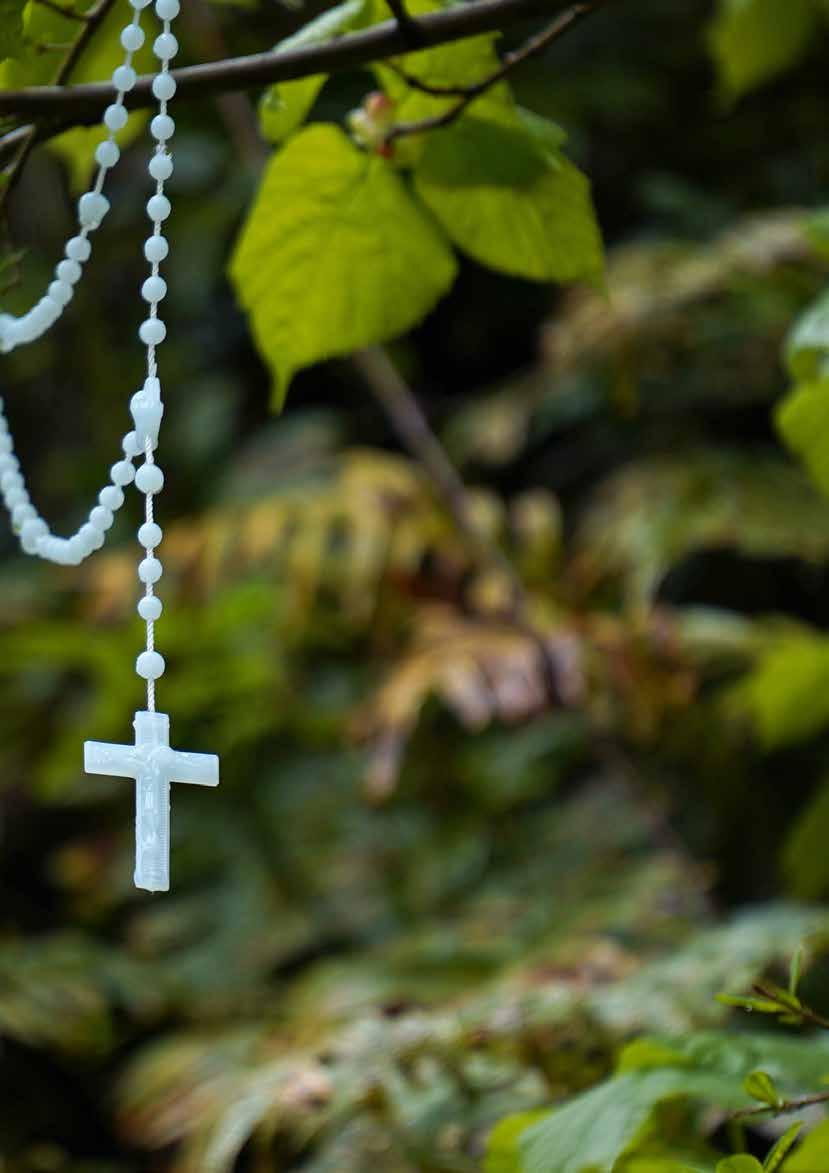

Symbols and Solidarity
Sometimes the heart emoji captures a complex sentiment of care and support more profoundly and quickly than a string of words trying to convey the same loving response. Although I do not believe we can/should communicate solely through the use of emojis or digital symbols - which risks errors in interpretation or over-simplification of profound and sensitive expressions - symbols have served humans since the earliest of times. Symbols express meaning and point beyond their own existence. The Catholic Faith has regularly employed symbols to deepen their faith bridging the material and spiritual worlds. After all, symbols have the potential to reveal aspects of Truth about God, who is unable to ever be fully explained/captured/described through language. Hence why theologians have explained the Divine with, ‘God is love.’
Last summer when Mrs Denise Brennan and myself were discussing and designing our School Altar cloth, we began by discussing our theme and then working towards how to depict it. We used our Farnborough Hill Jubilee Year Pledge to also inspire our 2025 - 2026 school year altar cloth. In this Jubilee Year, we committed ourselves to taking specific action to live out our faith and beliefs in a fresh and meaningful way:
We are pilgrims of hope.
We walk in solidarity with our sisters and brothers worldwide, sharing challenges and celebrating joys.
We promise to be agents of change, working together for justice, love and peace, locally and globally.
We want to build a fairer world, where every person, and the earth, can flourish.
We at Farnborough Hill will do this by:
• Supporting our local foodbank
• Fundraising regularly for our global family
• Including a prayer for our global family every week
• Welcoming refugees and migrants
• Speaking out for justice through the work of CAFOD
• Minimising waste at lunchtime
For the purpose of our altar cloth, we summarised this as ‘Living in Solidarity, living simply and living sustainably’.
But how does one understand and then depict ‘living in solidarity’? Solidarity is one of the principles of Catholic Social Teaching, guiding us on how to live out our faith in the world. The principle of solidarity calls for a recognition of the dignity and interconnectedness of all people and the necessity of working together for the common good, especially for the benefit of the poor and vulnerable.
After time and reflection, Mrs Brennan and myself were drawn to the image of hands. We wanted something more profound than a mere handshake or people holding hands. We imagined a multitude of hands of different sizes and colours raised together. Hands lifted symbolising the pledge each of us makes to work and reach towards this goal of recognising the interconnectedness of all. St Paul’s First Letter to the Corinthians (12:26) describes this principle of solidarity: “If one member suffers, all suffer together; if one member is honoured, all rejoice together”.
And so we lift our gaze to look beyond Farnborough Hill to recognise the suffering of our brothers and sisters around the world and raise our hands to pledge to pray for them, raise money to help them and walk with them.

Mrs Nelle Dalton, Chaplain, and I whizzed (literally - on WizzAir) to the Australian University in Rome to attend the Spiritus Conference at the end of September 2024. Spiritus draws together Catholic educational leaders from around the world to provide formation and support, discussing the most pressing themes in Catholic education today. It was a huge privilege to work alongside some outstanding speakers, including inspirational priests and diocesan educational leaders from Uganda, Austria, Kenya, Australia, Germany and the UK. We have made some firm friends and started to build networks for future links and sharing of good practice. Spiritus represents an important strand in the outworking of Pope Francis’ exhortation towards a synodal model for the future Catholic Church and we are excited that Farnborough Hill is playing its part.
Mrs Maria Young, Headmistress

Mrs Nelle Dalton, Chaplain
It was a great honour for us to have Bishop Paul Mason, the Catholic Bishop of the Armed Forces, celebrate our Whole School Mass in recognition of The Feast of the Sacred Heart of Jesus. This Feast Day holds great significance for our Farnborough Hill community. The Religious of Christian Education dedicated the School to the Sacred Heart of Jesus, making this an annual June tradition. The Sacred Heart symbolises the humanity of Jesus and His endless love for each of us.


Mass of the Holy Spirit, led by Fr John Chadwick from Sacred Heart Parish in Hook, had the added atmosphere of thunder and lightning!
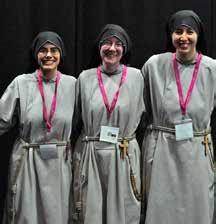
Three Franciscan Sisters came to Farnborough Hill to begin our week by leading us ‘Joyfully and Wholeheartedly’ in a Whole School Assembly on Monday 27 January 2025. Sisters Cecila, Chiara and Therese talked about their life dedicated to God and to serving the poor in their community in Leeds. They are all American, but have come over to the UK for a few years, and to support a local foodbank. They each talked about their vocation, or call to dedicate themselves to God, their life in community, and the joy from the experience of living a simple life with very few material goods (including no mobile phones - other than a ‘dumb’ phone they use when they travel in case of emergencies). After the Assembly, the Sisters had an opportunity to speak with various staff, the Sixth Form students in RE-Act and Years 7, 8, and 9 who chose to come to a drop-in session at lunchtime. We are most grateful to them for sharing their time, helping us to understand more about the vocation to religious life and bringing such joy as they spoke to us.
Mrs Nelle Dalton, Chaplain
SISTERS OF FRANCISCAN RENEWAL ADVENT CAROL SERVICE

The traditional Advent Carol Service brought together the wider community as we began the festive season: it was beautiful to see so many family and friends of the School, including Abbot Cuthbert and his Brothers from Farnborough Abbey, sitting shoulder to shoulder in our candle-lit Chapel.
Opening with the traditional ‘Once in Royal David’s City’, with Lower Sixth soloist Holly leading the way with her incredible voice, the service followed a traditional path, presided over by Fr Robin Farrow. In keeping with tradition the first two of our Advent candles proved a challenge to light (Abbot Cuthbert to the rescue!) and, as the story of Christmas unfolded and the service moved on, we were moved by the clarity and conviction of the readers. The Senior Choir had us in awe as they lifted their voices to rejoice at Christ’s birth and the true meaning of Christmas, with lesser-known carols mixing with firm favourites. Emma (Upper Sixth) and Naeve (Lower Sixth) lent their stunning vocals to solo pieces, while Alice (Year 9) and Saachi (Year 10) added instrumental flair.
Spiritual Life

The Lower Sixth Retreat saw the girls visit several local community-based organisations for a morning of volunteer work. A local care home, Food Bank and Primary School welcomed the students with open arms and they had a fantastic morning experiencing something different. The afternoon brought the Year Group back together for some mindful rock painting, and was rounded off with a reflective service at the Church of Our Lady and St Dominics, Farnborough.
CAFOD YOUNG LEADERS
This year we have had the privilege of being CAFOD Young Leaders, working as ambassadors for CAFOD to raise awareness and money for various projects across the world in both short-term disaster relief and long-term development.
We have raised awareness for CAFOD through Assemblies to the school in which we have explained the work which CAFOD does and its importance. In February 2025, we also, aligning with CAFOD’s belief in the dignity of all people, celebrated our second annual Culture Day. Through our Assembly, which involved the whole school; a culture market, where people shared items and food from their culture; and Irish language and Céilí dancing sessions with Mrs Michelle Furey, who travelled from Northern Ireland for the occasion, we celebrated many different cultures in our school community, bringing it all together under the theme of the Jubilee Year in the Catholic Church, ‘Pilgrims of Hope’.
Throughout the year, we have also had various fundraising events. This included a food drive for Farnborough Food Bank, a bauble decorating competition at Christmas time, and a Sponge the Teacher event for Sixth Form Charity Week. We also, in line with CAFOD’s roots, held two simple pasta lunches, for which the money we would have usually spent on lunch was donated to CAFOD. We all particularly enjoyed having the opportunity to take such an active role in our school community, and being able to bring to life our own
Christians around the world come together annually in prayer each January to celebrate what unites us and pray for unity. Reverend Carol Monk, Associate Priest - St Peter’s Church, Ash, led us in a prayer service on Monday 20 January 2025 to celebrate this Week of Prayer for Christian Unity. In addition to her parish work, Rev Carol serves as a Senior Chaplain in the Surrey Army Cadet Force (PWRR) and as a bank Chaplain at Frimley Park Hospital. We were grateful to hear her words of wisdom and stories of working alongside people of all faiths in her Army and Hospital Chaplaincy ministry.
Mrs Nelle Dalton, Chaplain

fundraising ideas, as well as continuing the great work of the past CAFOD Young Leaders.
One of the parts of the experience we have enjoyed the most is building a community, inside and outside school. We have worked with the Open Access groups in Years 7 and 8 and the Social Justice group, which has been a really lovely opportunity to spend time with other people in the school. As well as this, we have had multiple training days, where we have been able to connect with other people who also want to take action and have a shared passion for social change. These training days gave us a chance to discuss and share the different fundraising ideas each team had come up with, providing us with even more ideas to bring back to the School.
We have taken so much away from this amazing experience. As a group, we have become much closer friends, and have learnt to communicate more effectively with each other, and other members of our school community. During busy periods, we learnt to organise ourselves effectively and support each other, helping us to make sure we were fully prepared for all of the events we ran.
Overall, we are very proud of all our achievements this year and are thoroughly grateful for this opportunity. We have loved having the chance to make a difference in both the School and the wider community.
Niamh and Radhika (Lower Sixth)
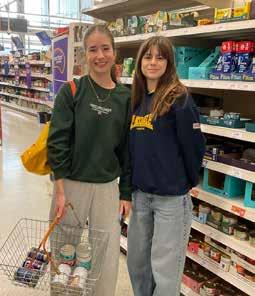
RE-Act

A year of reflection, action, and community in Sixth Form RE
‘My favourite part of RE-Act was the talk given by the Franciscan Sisters as it allowed us the rare opportunity to engage in open conversation with women who have devoted their entire lives to God. They were incredibly kind, approachable, and generous with their time, answering our questions thoughtfully and sharing deeply personal and inspiring stories about their spiritual journeys. Listening to them gave us valuable insight into the daily lives and motivations of people who live a religious vocation, people not unlike the RCE Sisters who originally established and ran Farnborough Hill. It helped me to better understand the roots of our school’s traditions and the values that shaped its history.’
This year, the Sixth Form RE course, known as RE-Act, has truly lived up to its name by encouraging students to both reflect deeply and take meaningful action. More than just a traditional Religious Education class, RE-Act has combined thought-provoking discussions with practical community involvement, creating a vibrant and inspiring experience for all involved.
One of the highlights of the year has been the St Vincent de Paul (SVP) group, led by Mrs Colleen Swire. This compassionate team of students committed themselves to supporting those in need within our local community. Through various fundraising activities, the group successfully raised money to purchase non-perishable food items for the Farnborough Foodbank. This handson project not only provided essential support to vulnerable families but also helped students understand the importance of charity and social responsibility. During one practical session, the Sixth Form SVP members walked down to the shops in central Farnborough to buy supplies for Farnborough Food Bank, using money from the Year 7 cinema fundraiser that was held the previous year by the SVP members. We bought many useful items, including deodorant, shaving foam and biscuits to put in the CAFOD donation boxes. This was a great experience as it was not only a fun trip out but it was also extremely rewarding and great to know that we were helping others.
The course has also featured a series of fascinating guest speakers who enriched students’ understanding of different faiths and social issues. Early in the year, the Franciscan Sisters visited to speak about vocation - what it means to dedicate your life to service and faith. Their insights offered a powerful perspective on commitment and spirituality, inspiring many students to consider their own life paths more thoughtfully.
Further expanding students’ religious literacy, Mrs Rupinder Sidhu delivered an engaging talk on Sikhism. Her presentation helped demystify this vibrant faith, highlighting its core beliefs and traditions. Similarly, Mrs Madeline Greene Lally gave a moving talk about asylum seekers, providing a humanitarian angle that connected faith with contemporary social justice concerns. These sessions fostered empathy and broadened students’ awareness of the world beyond their immediate environment.
Philosophy was another key element of the RE-Act curriculum, with Mr James Hobbs leading stimulating discussions that challenged students to question and debate big ideas about existence , morality, and belief. These sessions encouraged critical thinking and helped students develop their own reasoned viewpoints.
Meanwhile, Mrs Helen Jones brought a creative and environmental edge to the course. Her engaging quizzes on World Religions made learning interactive and fun, while her organisation of a local litter pick demonstrated the course’s commitment to caring for God’s creation by looking after our local environment. This combination of learning and practical action showed students how faith can inspire everyday responsibility.
The course didn’t stop there. Other sessions explored fascinating topics such as the role of the Pope, the ethical implications of artificial intelligence, and the spiritual significance of pilgrimage. Each topic was designed to challenge students to connect traditional religious teachings with modern-day issues and personal experiences.
Overall, RE-Act in Sixth Form has been a dynamic journey of discovery and engagement. Students have not only gained knowledge about a wide range of religions and philosophical ideas but have also put these lessons into action by supporting their community and environment. The blend of talks, discussions, and hands-on activities has made RE more relevant and inspiring than ever.
As this year draws to a close, it’s clear that RE-Act has done more than just educate; it has empowered students to think deeply, act compassionately, and live their values in the world around them. It’s been a year to remember - one where faith met action in the most meaningful way.
Molly (Lower Sixth)
CHARITY Charity Week

Sixth Form Charity Week is an annual event that raises money for causes close to our hearts through fun-filled events. It is an integral part of the Farnborough Hill year, and, this year, we were honoured to have organised it. We chose to support Harper Asprey Wildlife Rescue, Kidney Care UK, Phyllis Tuckwell and Jigsaw South East.
On Monday 17 March 2025 we wore green for St Patrick’s Day. It was great to see everyone in their green clothes and we loved all the brilliant shamrock-themed accessories!
Tuesday dawned bright for Kai’s Colour Run: a new, incredible event in honour of our late friend and classmate, Kai Somerville, who passed away in 2024. The sun was shining and there was not a cloud in sight whilst the School came together as a community to celebrate Kai’s colourful life - there is not a doubt in my mind that Kai would have loved to see us all laughing and running through the School’s beautiful grounds, especially considering the true love for nature Kai held.
We enjoyed the breakfast morning on Wednesday - a huge thank you to the Catering Team who provided us with delicious bacon and sausage baps, and a refreshing smoothie - a lovely way to start our morning! We, as the JLT, served the breakfast, which made us really appreciate further the immense effort the Catering Team put into making and serving lunch daily.




On Thursday, the Sixth Form’s final day of hosting, we held our annual Teacher LipSync Competition during lunchtime! The theme for this year was Movies and all the contestants did extremely well, especially our winners: Mrs Hocking, Mrs Sutton, Mrs McNerney and Miss White - their group name was ‘Le Petit Four’. The singing and dancing from the audience was almost as strong as the performances, and a special shout out to Delilah and the team of Sixth Form dancers for an unforgettable interlude with Rhianna’s Umbrella!
The CAFOD Young Leaders took over the events on Friday, and ran ‘Sponge the Teacher’ throughout lunch. It was hard for pupils to sponge their favourite teachers, but the fun was well worth it! Thanks to all the teachers who made the sacrifice for a good cause. On top of all the events, we had a bake sale every break time, which really added to the buzz around school throughout the week! The week was a colossal success and we are so proud to have raised over £12,000 for some truly deserving charities.
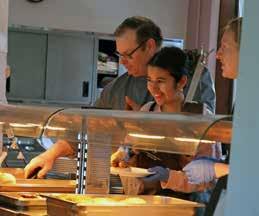
Eesha and Sugden (Upper Sixth)
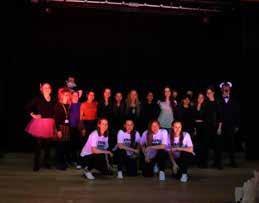




We raised a phenomenal £10,954.33!
What an achievement!
Farnborough Hill received a Ruby Star Award from Comic Relief, honouring our pupils’ consistent dedication over the past four years. Their 24-hour Endurance Challenge has become a school highlight, raising an incredible £25,000 for charity since it began.
24-hour Endurance Challenge
At 9.00 am on Friday 21 March 2025, 37 Year 11 pupils started our 24-Hour Endurance Challenge for Comic Relief. It was definitely the most memorable experience we’ve ever had at Farnborough Hill! Cycling for that long was undeniably exhausting but it felt amazing to be doing something for such a good cause. It was tough at times, but knowing we were raising money for people who need it kept us going.
The fundraising didn’t stop with the cycling! We hosted a fantastic array of lunchtime activities for the whole school to enjoy, from ‘Pin the Nose’ to ‘Guess the Name of the Jellycat’ and a basketball competition, to name a few, all of which contributed to our fundraising total.
My favourite moment was when we reached halfway and we all sang Livin’ On A Prayer which created such a good atmosphere and perfectly encapsulated our shared resilience!
We raised a phenomenal £10,954.33 with the Endurance Challenge, which we were all so pleased with. This is definitely an experience that none of us will ever forget and a great way to end our last full term of Year 11.
House Spirit
ABBA House Music Competition
New for 2024 - 2025 was the House Music Competition, where each House had to perform an ABBA song! Everyone rose to the occasion, with enthusiastic singing, lively choreography and imaginative use of props bringing life to every performance. Each House also presented a small ensemble performance featuring singers and instrumentalists, and it was a joy to see girls from across the Year Groups working together to polish their arrangements of their chosen songs.
The competition was adjudicated by Sarah Latto, a professional choral conductor, singer and arranger, who praised many individual contributions to each performance, before selecting the overall winning House. It was extremely close, but congratulations to Bickford House for being the first winners of the House Music Cup!
Mr Patrick Martin, Teacher of Music
MasterChef


Showcase

There was real excitement as all five Houses battled it out in the hotlyanticipated MasterChef competition, brought to us by the brilliant Dutertre House. Five teams, each representing a House, donned their aprons and competed in a fun and creative cooking showdown. The challenge? To whip up a batch of vibrant cookies and prepare a traditional minestrone soup packed with fresh vegetables, all while adding their own unique twists and style to the dishes.
Everyone started with the same ingredients and instructions, but that’s where the similarities ended, as each team brought their own unique flair to the table. For the cookies, some Houses opted for multiple colours to cover their cookies whereas others elected to only use their House colours in a ‘less is more’ fashion. Each of the designs displayed each of the Houses’ personalities. The minestrone soup competition was just as creative - some teams kept it simple and classic, focusing on the perfect balance of tomatoes, onion, carrot, basil, parsley and pasta, while others added extra garnishes like parmesan to elevate the presentation. The cookies were perfectly shaped, the vegetables were well cut and both dishes were displayed with care and consideration.
Our esteemed judges, Mrs Anne Griffiths, former Deputy Head, and Mrs Anne Goddard, former Head of Food Technology, kindly returned to lend their expert palates. Their keen eye for detail and appreciation of culinary creativity made for a fair and exciting judging process; they crowned Bickford House as the winners!
There was an exciting range of performances on stage for the House Showcase in February 2025, including tap and contemporary dance routines that captivated the audience with their rhythm and energy, and a powerful performance from drama enthusiasts which showcased their acting skills and enveloped us in the scene. We were then inspired by a demonstration of some remarkable abilities in sign language singing before a performance of slam poetry, in which we saw true passion highlighted through spoken word.
The peak of the afternoon was the fashion show, where pupils strutted down the runway in handmade outfits, showcasing their creativity and unique sense of style all around a bold “diva” theme.
The House Showcase was a fantastic celebration of pupil creativity, talent, and hard work, bringing together the entire school community in support of one another’s abilities. It was an event to remember, and we all truly appreciate the skill and dedication of those involved!
Aanya and Arilyn (Upper Sixth)

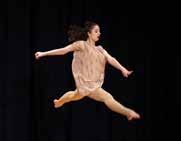
Tabitha (Upper Sixth) House
Inter-House Quiz
The end of the Autumn Term 2024 brought with it the annual House Quiz! Hosted by sixth formers and featuring fiendishly tricky rounds, mixed teams from across the Year Groups battled it out for coveted House points!
Inter-House Public Speaking
At the end of the Summer Term 2025 the Inter-House Public Speaking Club took place for Years 7 - 9 and culminated in a hard-fought contest on Friday 20 June 2025. Each House presented a Speaker and a Chair and demonstrated remarkable preparation and skill. The judging panel, comprised of the House Captains and ably chaired by Alyssa (Lower Sixth), had a challenging task in selecting the winners, due to the exceptionally high standard of presentations.
The individual awards were presented to:
• Best Speaker - Shreshta (Year 9)
• Best Chair - Evie (Year 8)
• Best Personality - Sanvi (Year 9)
The winning House was... Dutertre! Congratulations to Shreshta and Evie for leading their House to the win.
Mrs Maria Young encouraged all pupils to consider the profound impact that strong public speaking can have on our lives. Oration is not only a vital life skill but also a deeply empowering and thoroughly enjoyable experience.
Mrs Lori Winch-Johnson, Head of McCormack House

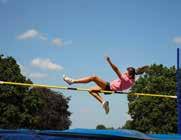

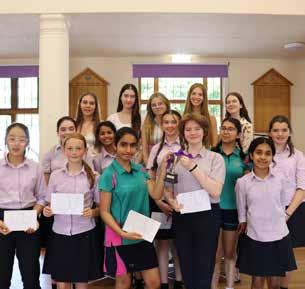
Inter-House Sports Day
This year’s Inter-House Sports Day brought a slight change of pace! Due to the blazing heat, the day kicked off earlier than usual, with the Lucy’s Loop and 800m races taking place in the cooler morning hours. With a fantastic turnout of girls cheering on their peers at the athletics track, it was a truly brilliant start to the day.
After a brief return to lessons and a delicious BBQ lunch, the entire school descended upon the Athletics Field for the annual Inter-House Sports Day. Parents had already settled into their shady spots with picnic blankets, and food vans were ready to fuel a jam-packed afternoon of competition.
The excitement continued with a series of thrilling events, including relays, impressive High Jump and Long Jump attempts, powerful Shot Put throws, and expert Hurdle jumping. There was also a spectacular display of Javelin, drawing cheers from the crowd.
The afternoon culminated in the legendary Staff vs Sixth Form 4x100m relay. Fuelled by a long-standing rivalry between the PE staff and the sixth formers, the event was a nail-biter! Ultimately, the Sixth Form team of Mia, Holly, Alyssa and Naeve emerged victorious.
Well done to all the fantastic participants! Your energy and sportsmanship truly made the day a success! A massive shout-out to Mostyn House for a spectacular Sports Day, taking home both the Lucy’s Loop race and the Sports Day Cup! Champions all around!

AND THE 2024 - 2025 HOUSE CHAMPIONS ARE...
Artists Inspired
A trip to the Knitting and Stitching Show at the Alexandra Palace in London in October 2024 provided valuable inspiration for GCSE Art pupils. Emily (Year 11) commented: “Seeing artists’ work in person has given me lots more ideas and techniques which I can apply to my coursework, and I have also discovered new artists who I look forward to studying in depth as part of my research”. Meanwhile, those pupils focusing more on Ceramics for their GCSE and A level work were treated to a day at the Art in Clay show at Farnham Maltings. Imogen (Year 10) said: “It was extremely helpful to see artists showcase their skills in front of us, and really interesting to see different techniques and styles of pottery, from figures to dishes and lobsters to mugs. There was so much to see and it was a great opportunity to gather ideas for our own final project pieces.”



A level photography students spent a day in London seeking inspiration for their projects. Lois (Lower Sixth) described the day:
“We started our day at the Leake Street Arches where we took some shots of the amazing graffitied walls. We then went to The Photographer’s Gallery and looked at the two fantastic exhibitions showing there. My personal favourite was Letiza Battaglia’s photos from 1980s Italy.
Lunch was in Leicester Square, where we stayed to work on individual components for our coursework as well as challenges in response to some of Gillian Wearing‘s famous photos. One of my favourite parts of the day was using a film camera to take photos of different text types throughout London.”



GCSE and A level artists enjoyed a once-in-a-lifetime trip to the sell-out Van Gogh ‘Poets & Lovers’ exhibition at the National Gallery.
The popularity and uniqueness of the exhibition stemmed from it being the first time ever that Van Gogh’s works, from his earlier pieces to those of his later life, have been collected together into a series. His style allows each painting to filter into the next, thanks to his ability to create works that centre around movement and shape, never appearing stagnant. This created an inspirational and coherent experience that offered an insight into, not only the artist himself, but also the impressionism which provides his justifiable fame.
After viewing and creating drawn responses from his work in the peace of the gallery, we wandered through the bustling Christmas market just outside. The atmosphere created by vendors helped get us into the Christmas spirit as we sat on the sunny steps, looking over the gleaming fountains of Trafalgar Square against the seasonal festivities of London.
Frances (Upper Sixth)









On a cold, crisp Tuesday in January 2025, the Year 11 and Sixth Form Art pupils embarked on our ‘Tate to Tate’ trip to London. Leaving promptly at 9.00 am, we enjoyed a coach journey full of sightseeing and laughter, before we eventually arrived at our first stop: Tate Britain.
In Tate Britain, we toured in groups around the permanent exhibitions, taking ourselves on an enriching journey through the different art movements and media that have taken place in Britain over the years, as well as appreciating the stunning architecture around us. We also had the wonderful opportunity to visit the Turner Prize exhibition, which explores the best of British art, including many impressive pieces from the four artists that had been shortlisted for the Turner Prize this year. There were several fascinating installation rooms decorated entirely in cloth to create a maze full of captivating and emotive pieces.
At midday, we bid Tate Britain farewell, and excitedly set off for an invigorating boat ride along the Thames, capturing photographs of London from unique viewpoints, before arriving at Tate Modern. There, we explored one of the most popular exhibitions of the trip: ‘Electric Dreams’, comprising a selection of visual, interactive artworks that challenge the fixed ways in which we view art and its processes. We marvelled at optical illusions and captured stunning videos of light manipulation, whilst exploring the varying ways that different artists interpret the world around us, and how artists constantly find new ways to engage the senses and play with our perception. We also had the opportunity to explore the permanent exhibitions here, including a powerful photography exhibition that demonstrated the ideas of identity and community in emotional photographs, before sadly wishing Tate Britain farewell, full of memories and ideas for our latest art projects. It was a wonderful trip, inspiring and exciting us all - a big thank you to everyone who helped to organise and chaperone us on this section of our journey as artists!




Arilyn (Upper Sixth)
Year 7 enjoyed a whole Year Group trip to Kew Gardens where they explored the beautiful art within nature, and art inspired by it. They then created their own colourful oil pastel drawings of plants.
Artists Inspired

Year 8 experienced a fantastic hands-on printmaking workshop with Berkshire Printmakers. Their outcomes were a riot of colour!

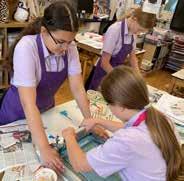


Artists from We Explore Drawing shared their techniques with GCSE and A level pupils at an all-day workshop. The pieces produced were nothing short of beautiful and a testament to the immense skills of both the visiting artists and our girls.





Artwork


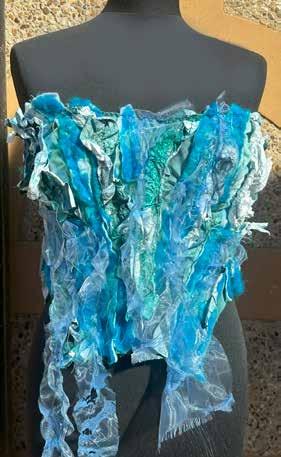



Isla B, Year 11
Floreana, Year 11
Greta, Year 11
Livvy V, Year 11
Sophia S, Year 11
Scholars’ Club Collaborative Project








Maëlle, Year 11
Maëlle, Year 11
Keira, Year 11
Jemima, Year 11
Maggie, Year 11
Ava B, Year 11
Anna, Year 11
Fran, UVI




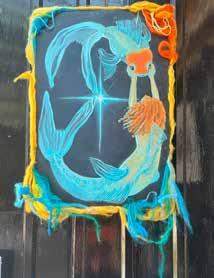
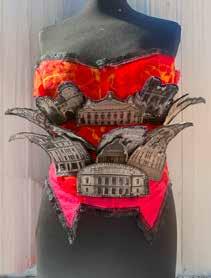




Celeste, UVI
Maëlle, Year 11
Celeste, UVI
Greta, Year 11
Maggie, Year 11
Misha, Year 11
Darcy, Year 11
Alina, Year 11



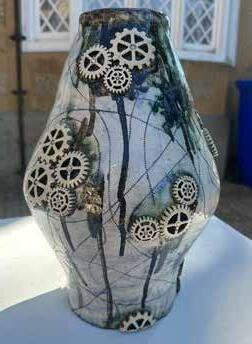




Emma F, UVI
Alice S, Year 11
Ruby-Mae, Year 11
Ruby-Mae, Year 11
Lexie, Year 11
Alyssa, LVI
Alexa A, Year 11
Darcy, Year 11













Ruby-Mae, Year 11
Lexie, Year 11
Floreana, Year 11
Veni, Year 11
Veni, Year 11
Maria, LVI
Grace, Year 11
Rose, Year 11
Tamar, Year 11
Alicia, LVI
Surina, Year 11
Evie, Year 11
Arilyn, UVI

SPORTING SKILLS
Following yet another action-packed year of Sport on the Hill, there is much to celebrate, reflect on, and take pride in. The pages that follow offer just a snapshot of the many high points and the pupils who have achieved success across a range of sporting arenas. These moments - whether big wins or quiet breakthroughs - represent powerful learning experiences for both pupils and staff. Many of the events I’ve had the privilege to witness or be part of this year have reminded me exactly why sport remains such a deep and lasting passion of mine.
It’s important to remember that success looks different for every pupil. For some, it might be summoning the courage to try a sport they’ve never played before - or even re-engaging with one after a difficult past experience. For others, it might be standing proudly on the podium at District, County, Regional, or National level. Both ends of this spectrum deserve to be recognised and celebrated - whether with public applause or a quiet word of appreciation - because both require courage and commitment. Two qualities that lie at the heart of a young person’s sporting journey and are well captured by the quote:
“Courage is the commitment to begin, without any guarantee of success.”
One of the reasons so many of us are drawn to sport and competition is its unpredictability. Ironically, it’s this same unpredictability that often creates hesitation - the fear of the unknown can be daunting. That’s why when a pupil steps out of their comfort zone to try something new, or when a team gives their all regardless of expectation, those are moments truly worth celebrating.
Our aim is to foster an environment where every girl feels supported, where value is added to every experience, and where success - however it is defined - is within reach. We want every pupil to feel confident enough to be active, to participate fully, and to compete with pride.
Looking ahead to 2025 - 2026, my hope is to witness even more moments of courage and commitment. We will continue to offer as broad and balanced curriculum and co-curricular programme as possible, ensuring that every pupil has the chance to discover their own version of success.
As you turn the pages that follow and explore this year’s many achievements, please remember: for every name listed and trophy won, there are countless quiet victories that happened away from the spotlight. And it is those moments, just as much as the headlines, that fill us with immense pride.
Mr Dan Emery, Director of Sport
Hockey
Over the course of the 2024 - 2025 season, nearly 80 Hockey fixtures were completed, ranging from our U12B team, all the way through to our U18 1st XI. It has been fantastic to see so many girls take part in matches and training, with many girls in the Lower School trying out Hockey for the first time; some were even brave enough to take on the challenge of goalkeeping!
Competitions ranged from local friendly matches, to county tournaments, to regional finals and Independent Schools Association (ISA) Nationals, with some brilliant successes along the way. Leading the way were our older teams; the U16A team finished 2nd in the Hampshire round of the England Hockey Tier 3 Championships and progressed to the South-Central Regional round. There, they were met with stiff opposition from Berkshire, Buckinghamshire and Oxfordshire schools but battled through to the final, where they were just pipped to a place in the National Finals by a last-minute goal. The U15A team had a tough draw in the Independent Schools Hockey Cup and lost in the early rounds of the Plate competition. The team bounced back well at the ISA National Finals, finishing in 3rd place overall. Our U13A team had a successful day at their ISA National Finals as well, finishing in 7th place overall. For our U12 teams, it was a year of learning about the sport and there were some huge improvements in their individual and team performances; we are very excited to see them grow and develop over the next few years.
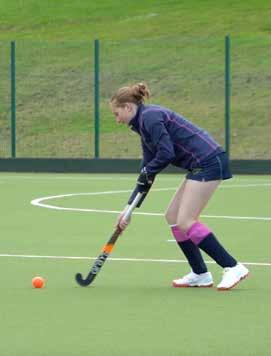



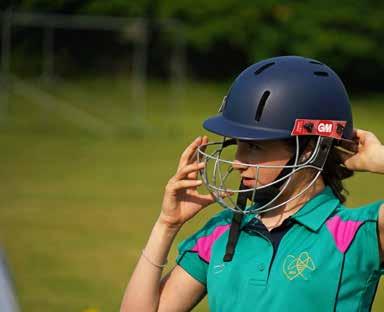


This year has been a fantastic year of Cricket at Farnborough Hill, as the sport continues to thrive thanks to the dedication of our pupils and the ever-growing enthusiasm across the School community.
Netball
This year, we had 18 teams from Years 7 - Upper Sixth competing in Netball clubs, fixtures and competitions from September 2024 to April 2025. The girls enjoyed a number of both friendly and competitive fixtures, and our VII also playing competitive matches this year.
The results of the fixture league table and district tournaments were as follows;
League table placings:
Year 7 - A team 3rd
Year 8 - A and B teams 4th
Year 9 - A team 3rd / B team - 1st
Year 10 - A team 3rd
Year 11 - A team 1st / B team - 3rd
District Tournaments:
Year 7 - A team 3rd / B team 3rd
Year 8 - A team 5th
Year 9 - A team 3rd / B team 2nd
Year 10 - A team 3rd / B team 6th
Year 11 - A team 1st / B team 2nd
We participated in a number of external competitions this year across various age groups. This included the School Sports Magazine National Netball Competition, Sisters’n’Sport National Netball Competition, World School Games in Loughborough, ISA National Finals, Hampshire School’s county tournament and some preseason friendly tournaments at Queen Anne’s School Caversham, Lord Wandsworth and Gordon’s.
Our U15 A team deserves particular mention for their success in the School Sports Magazine Competition, making it through four rounds, each very competitive and exciting games, to reach the quarter finals, which is a superb result. Meanwhile, in the prestigious ISA competition, our U13 team finished 3rd in the group stages, 3rd in the Bowl and in incredible 11th nationally!
The season began indoors, with the U15 team making an outstanding run all the way to Finals Day at the Utilita Bowl in Southampton - the proud home of Hampshire Cricket. Narrowly missing a spot in the final, they secured an impressive third-place finish in the county. The U13 team also made their mark, finishing third in the local round of the indoor tournament and setting a strong foundation for the summer to come.
As the sun emerged, so did Cricket in full swing, with an incredible nine teams competing in a mix of softball and hard ball fixtures. In total, 50 matches were played across the season - showcasing the spirit, talent, and perseverance of our players. Farnborough Hill proudly entered teams into the County Hard Ball Cup, the National T20 Cup, and the National 100 Ball Cup. The U15 team shone once again, reaching Round Two of the National 100 Ball Cup, a testament to their hard work.
This season also saw some truly inspiring individual moments. Several pupils played their first-ever games of Cricket, rising to the challenge with energy and determination. Others who stepped up to take on hard ball Cricket for the first time, demonstrated courage and rapid improvement. The School celebrated a new milestone with its first-ever half century, followed closely by two more. Equally thrilling were the many personal achievements: pupils claiming their first wickets, executing bowled, catches, and run outs, and continuing to develop their technical and tactical understanding of the game. The skill progression across all levels has been a joy to witness.
With over 60 pupils actively involved in the Cricket Club and new talent emerging every week, enthusiasm for the sport is at an all-time high. The installation of indoor nets and our brand-new bowling machine has brought an exciting edge to training, ensuring our teams are prepared to grow year-round.
It has been a glorious summer, filled with sunshine, camaraderie, and unforgettable moments. Cricket has well and truly come alive on The Hill, and every pupil involved should be incredibly proud of their commitment, progress, and sportsmanship.
SPORT

Football


Football has truly blossomed this year at Farnborough Hill, with enthusiasm, determination and sheer love for the game from our pupils across all Year Groups. The sport has seen remarkable growth, both in participation and success, making it one of the most exciting areas of development in our co-curricular programme.
With fixtures increasing from 24 to 32, and countless medals proudly collected along the way, it has been a season defined not only by achievement, but by commitment and joy. Whether competing locally or representing the School in national tournaments, the girls have displayed the values that Farnborough Hill holds dear: courage, compassion and integrity.
A highlight of the year was the inclusion of our Sixth Form pupils in a competitive football match for the very first time - a great step forward that we are keen to build upon in future seasons.
In the local leagues, Farnborough Hill fielded both U13 A and B teams for the first time:
• U13 A finished in 7th place overall and progressed to the quarter finals of the cup.
• U13 B secured a strong 4th place position, reflecting their growing tactical awareness and teamwork.
• U16 placed 5th overall, demonstrating consistent effort and resilience throughout the campaign.
Beyond league play, our U13 A team earned an impressive 3rd place finish in the District Tournament - a testament to their tenacity in a very competitive field.
The U14s made their mark in the National Cup, reaching the 3rd round and facing some of the well-established football schools with determination and pride.
The success did not end there, with the U13 A team heading to the Gordon Tournament, and winning with conviction, scoring 16 goals and conceding only 3 - a true showcase of skill and spirit.
Our teams also made their presence known at the ISA competitions:
• The U15s battled through tightly contested group stage matches to reach the final of the Plate competition, finishing as runners-up.

• The U13 A team progressed undefeated through their group stage, earned a spot in the Cup Final, and finished second place after a thrilling match.
It has been a season to be proud of. Football continues to thrive at Farnborough Hill, fuelled by the girls’ passion, dedication and willingness to support one another. As we look ahead, the future of the sport in school is bright.
Tennis
This year we had A teams across Years 7 - 10, with lunchtime clubs full each week and fixtures after school for all age groups. Our annual trip to Chelmsford for the ISA National Tennis competition for the U13 and U15 girls included a full day of singles and doubles matches. The U15 team, comprising Arelia, Sienna, Sophie and Aisling, had an incredible day with Sophie securing 1st place in the Plate singles competition after a thrilling tie breaker and Aisling winning 1st place in the Cup singles competition! Sophie and Aisling then claimed 1st place overall in the doubles round robin competition.
Meanwhile, in the U13 competition, Emily finished 3rd in the Plate singles competition while Sophie, Ava and Engeli enjoyed a sterling day of tennis honing their competitive edge.
It was lovely to see our tennis players representing the school and competing in some high-quality tennis.
We also entered the School Sports Magazine National Tennis Competition for the first time this year, entering the U14 age group with a team of four girls - Lucy, Maria, Charlotte and Bronwen. The girls beat Churcher’s College and St Swithuns School to face Oxford High School in the fourth round, unfortunately losing to them, but putting in a brilliant effort throughout.
Cross Country
Cross Country continues to thrive at Farnborough Hill, with growing numbers of girls lacing up their trainers and embracing the challenge. Regular participation in local 5K park runs, combined with an increased awareness of the mental and physical health benefits of running, has inspired a surge of interest across Year Groups. Whether aiming for PBs or simply enjoying the fresh air and sense of community, our runners embody resilience, determination, and joy - core values that echo far beyond the finish line.
Many competitions saw the various teams bring home silverware:
Prior’s Field Invitational - Year 9 Cross Country team finished in 1st place.
ESAA National Schools Cross Country Cup (Hampshire round) - over 600 schools entered
• Junior Girls team - placed 3rd
• Inter Girls team - placed 3rd
Both teams qualified for the regional finals, where we were up against 45 other schools. Unfortunately we missed out on a place in the Nationals, but Junior Girl team member Eliza secured a Bronze medal.
Senior District Cross Country Championships - U15 District Champions
ISA Cross Country Championships
• U14 team - placed 2nd
• U16 team - placed 3rd
• Individual medalists - Jessica (U14) Bronze medal
Junior District Cross Country Championships (hosted by Farnborough Hill!)
• U13 team - 2nd
• U14 team - 3rd
Individual medallists:
• 1st place - Eliza (U14)
• 1st place - Ella (U13)
• 3rd place - Olivia (U13)
Hampshire Schools Cross Country Championships - Eliza (U13) Bronze medalist
Badminton
The start of 2024 saw our Badminton teams from Years 7 - 11 have the greatest number of fixtures they have had to date, including competing in the School Sports Magazine National Competition for the first time in both the U14 and U16 age groups. Girls have participated enthuiastically in the Badminton Co-curricular Clubs and, this year, we also ran our first performance squad session to prepare for the major competitions.
ISA National Badminton Competition
In November 2024 our first major competition for the U15s was held at Nottingham University, where four of the team competed in the ISA National Badminton Competition. There was huge success and many singles and doubles matches played throughout the day. Udita came 1st place in the singles competition, and this was followed by Udita and Mika placing 1st in the doubles competition, and Darcie and Sophia securing 3rd place in the doubles competition.
Our U13s also attended the same competition, with Lorelei coming 1st in the singles competition, noting that she was the only Year 7 who played up an age group, so a fantastic achievement for her. Susie placed 2nd in the singles competition, followed by brilliant success in the doubles. Eliza and Lorelei came 1st, with Maeve and Susie coming 3rd. For many of these girls it was also their first tournament so we are very proud of how well they have done.
School Sports Magazine National Badminton Competition


Amongst our fixtures, we also entered a knockout cup competition this year where the girls faced other schools in the south west, progressing in the competition only if they won a majority of games. With all pupils playing a singles match, followed by a doubles match, every point was crucial in case of a tie! The competition comprised of four rounds, followed by a quarter-final, semi-final and final. Our U16 team had some really tough games but progressed through to beat Queen Anne’s, Clifton College and South Wilts Grammar School to make it through to the quarter finals where they lost to Oxford High School. A super achievement for the squad comprising Udita, Shawna, Maria, Darcie and Cecilia.
Our U14 team also reached the quarter finals! They beat Matthew Arnold School, The Oratory School and South Wilts Grammar School. They played a very strong Dr Challoner’s High School team in the quarter finals to miss out, sadly, on the semi finals but it was a super effort from the squad of Darcie, Cecilia, Lorelei and Alyssa.
District and County Finals
Our U14 and U16 teams took part in the District Schools’ Competition where both teams comfortably placed 1st to get through to the county finals held in Eastleigh in May 2025. This was a whole team competition where points accumulated per match. The U16s (Udita, Sophia, Mika and Isabel) finished joint 2nd on points, but 3rd overall on point difference. The U14s (Darcie, Lorelei, Cecilia and Alyssa) finished a super 2nd overall. Really well done to both teams, with some of the girls playing a year up in their competition age group.

SPORT
Athletics
Athletics season is the highlight of the year for many of our girls, who love to test their limits on both track and field. At Farnborough Hill, we actively encourage all athletes to develop their skills in both areas, fostering all-round ability and confidence. Each Year Group sees around 20 pupils given competitive opportunities, as we proudly field A and B teams for both track and field events. In addition to several district open competitions, where many girls explored new events and achieved personal bests, our athletes also take part in National and County level championships. The season was marked by determination, progress, and passion, with every athlete contributing to the team’s spirit and success.
Senior District Track and Field Championships
U17 team - 2nd
U15 team - 1st ‘Symonds Trophy’ U17 individual medalists:
• 1st Mia - Javelin and Best Field Performance
- winner of the ‘Davies Trophy’
• 2nd Evelyn - 80m Hurdles
• 2nd Callista - 800m
• 2nd Morayo - Shot Put
• 3rd Lily - 80m Hurdles
• 3rd Isabel - 300m
• 3rd Karenza - High jump

U15 individual medalists:
• 1st Freyja - 800m
• 1st Brooke - High jump and winner of the ‘Inkpen Trophy’ for Best Field Performance of the day
• 1st Rebecca - Discus
• 2nd Lea - 1500m
• 2nd Kamsi - Shot Put
• 3rd Lois - 75m Hurdles
• 3rd Lucy - 300m
• 3rd Jessica - 200m
• 3rd Jessica, Brooke, Lois, Freyja and Annabel - Relay
Hampshire Schools Track and Field Championships
• 1st Zara - 100m Inter Girls
• 2nd Freyja - 800m Junior Girls District Combined Events Championships
• U14 team - 2nd
• U15 team - 2nd
• 2nd Brooke - High Jump Junior Girls
Individual medalists were Freyja - 2nd in U15, Lucille - 2nd in U14, Brooke - 3rd in U15 and Eliza - 3rd in U14! Freyja and Brooke went on to compete at the Hampshire Schools Combined Event Championships, where they both achieved personal bests.
ESAA Track and Field Cup 2025
Our Inter Girls Team (Years 9 - 10) competed at the County round of this event and finished in an impressive 3rd place. This saw them qualify for the Regional Final. This is a tough but fun competition where athletes have to work as a team, and the focus is on performances (distances and times) and points rather than positions. This year saw 650 schools participate in this National Competition and we found ourselves competing against some really strong schools in the regional round, where we were thrilled to finish in a very respectable 6th place!
Our top three highest scorers over the course of the competition were Freyja - 800m 28 points 2.24.2s, Lea - 1500m 24 points 5.18.9s and Callista - 300m 23 points 44.6s!
ISA Athletics Championships
Several of our athletes opted to compete at the ISA London West qualifying round despite it taking place during our Summer Assessment week. Medallists were Lucille - 1st in the U15 200m, Freyja - 1st in the U15 800m and Lea - 3rd in the U15 1500m. Following this qualifying round, Freyja and Lucille went on to compete in the National Finals at the Alexander Stadium in Birmingham - a world class international athletics venue, used as the training base for the US and Jamaican athletes when we hosted the London Olympics in 2012. Freyja finished in 3rd place, winning a bronze medal in the U15 800m and gaining a new personal best and another school record, while Lucille finished in 2nd place in the U15 200m and 3rd place in the U15 4x100m relay, coming home with two medals. Well done to both of them - amazing!
Junior District Athletics Championships
14 schools from all over the district took part. Our Year 7s finished in 2nd place with a team total of 77.5 points, bringing home the Runners Up Trophy. Our Year 8s finished in 3rd place with a total of 58 points and an improvement on their total score of 45 points last year - they should be thoroughly pleased with their performance!
Year 7 individual medallists were:
• Ella - 1st 600m
• Lorelei - 1st Javelin
• Olivia - 2nd 1000m
• Lorelei - 2nd 150m
Year 8 medals were earned by:
• Lucille - 1st High Jump, 1st 200m
• Eliza - 2nd 1500m
• Mary Jayne, Lore, Eliza, Lucille 3rd 4x100m relay
• Ella, Lexie, Sophie, Lorelei - 2nd 4x100m relay
• Abigail - 3rd High Jump
• Rosa - 3rd 70m Hurdles
• Farrah - 3rd 1500m
• Mary Jayne - 3rd 200m
Congratulations to Lucille for winning the U14 Girl’s Best Field Performance trophy of the day for her high jump of 1m 42cm. Lucille also managed to get the third best track performance of the day with her 200m performance!
In Year 7, Lorelei was awarded the U13 Best Field performance trophy for her Javelin distance of 21m 81cm. Well done! Farnborough Hill was also awarded 3rd place for the Aggregate Relay award.
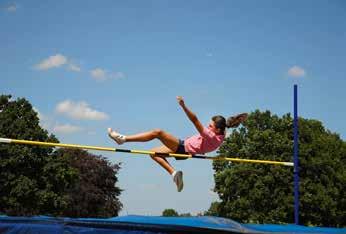


Swimming

Gymnastics
This year has seen exciting progress for Gymnastics at Farnborough Hill, with increased involvement in both local and national competitions. A particular highlight was our debut in a GCSE Trampolining competition in March 2025 - a first for the School and a fantastic experience for all involved. Thanks to the generous support of the Friends, our squad proudly represented the School in brand-new leotards that added a real sense of team spirit. With excellent facilities, including an Olympic-sized floor space and an inflatable tumble track, our gymnasts continue to push boundaries, build confidence, and showcase their incredible talent.
Competition highlights included: ISGA Gymnastics 2-piece Championships (Floor and Vault)
• U13 team - 4th
• U15 team - 5th
Invitational Floor and Vault U13 Individual Competition
• Rosa - 1st place on floor
• Hettie - 2nd place on floor
We also hosted our first Gymnastics Festival here at Farnborough Hill, where our Junior gymnasts (Years 7 - 9) had the pleasure of welcoming talented Years 5 and 6 pupils from St Nicholas School for a special afternoon of gymnastics. Demonstrating true leadership and enthusiasm, our girls led the warm-up, shared their skills across a range of apparatus, and acted as fantastic role models throughout the session.
The visit concluded with inspiring solo and group routines performed to music, showcasing creativity, strength, and teamwork. We were delighted to be joined by supportive parents and friends, who enjoyed a celebratory tea while the younger gymnasts received certificates to mark their participation. It was a joyful and memorable event for everyone involved - one that perfectly captured the spirit of community and encouragement at Farnborough Hill.
This year, Swimming at Farnborough Hill has seen much success and increased participation - bringing together skill and determination. With over 50 pupils representing the School across a range of competitions, it has been a season defined by wholehearted participation, resilience and pride in progress.
Returning to the Hampshire Secondary Schools Teams Championship relay event was a great thing to see and be a part of. In a highly competitive field, our teams delivered impressive results:
• Seniors placed 5th
• Intermediates secured 7th
• Juniors finished 10th
At the GSA Swimming Championships, our pupils continued to shine:
• Juniors placed 5th
• Intermediates came 7th
• Farnborough Hill achieved an overall 5th place finish, a testament to the depth of talent across the school
Individual brilliance was on full display at the ISA Qualifiers:
• Isla placed 1st in both the 100m Freestyle and 100m Backstroke, hitting national times once again
• Annabel placed 8th in the 100m Freestyle and 9th in Breaststroke, also achieving national times
• Abbie and Lucile delivered strong performances in their heats, placing 5th and 4th respectively
The ISA Finals brought further celebration:
• Isla claimed 1st place in the 100m Backstroke, 4th in the 100m Freestyle, and contributed to a 1st place Freestyle Relay and 3rd place Medley Relay. Her achievements are nothing short of superb.
Beyond the medals and rankings, this season has been about growth, with more friendly competitions added to the calendar; pupils across all Year Groups had the chance to dive in, challenge themselves and support one another.
